#as something so defined despite the meaning of that term meaning everything but
Explore tagged Tumblr posts
Text
I WANT TO BE FOREVER YOUNG


PROMPT. How they mourn when you were gone too soon. You did worry about getting old, didn’t you?
FEATURING. Midoriya I., Bakugou K., Todoroki S., Shinsou H.
NOTE. I’m testing the waters with angst content + formatting style for multiple drabbles—so forgive me if it’s not that good!


MIDORIYA IZUKU — Sees you in someone else.
Midoriya Izuku found passion in teaching. It’s a life-changing job that molds each and every student into the person they want to become with the help of people like him.
His students, vibrant and full of life, were so much like his old classmates—and among them was Takashiro Ayane, her laughter light and melodic as she teased one of her friends about their clumsy landing during training.
It reminded him of someone. Someone close.
You.
And the thought always came to him, even when he didn’t mean to. Even at the most random times.
Ayane’s resemblance to you was uncanny. It wasn’t just her kindness or the gentle way she spoke; it was in the way she held herself, her subtle but unwavering resolve. Midoriya could see flashes of you in her—the friend who had once been a constant source of warmth in his turbulent journey at U.A. High.
As Ayane reached up to adjust her headband, smiling brightly, Midoriya felt a pang in his chest. The sight was like a memory brought to life, a reminder of your soft-spoken encouragement and the way you always stood firm despite your fears.
God, it felt like seeing you all over again.
“Sensei!” another student called out, pulling him back to the present. “Did you see that move? I think it might actually work in combat! Or support, if I feel like it.”
Midoriya blinked, shaking off the haze of memories. “Y-Yeah, it looked great!” he replied, mustering enthusiasm. “Your timing’s improving a lot—keep it up!”
He tried to push the thought aside, focusing on the here and now, but it was no use. The resemblance was too striking, and his heart felt heavy with the weight of unspoken grief. You were gone, after all. Gone too soon.
As the students broke into laughter again, something about the carefree sound and the dynamic of his students triggered a reflex. Without thinking, he spoke, his voice soft yet audible enough to be heard.
“[First Name], I—”
Your name left his lips before he realized it, and the world seemed to freeze. The students fell silent, their laughter replaced by curious stares. Ayane tilted her head; confusion could be seen in her face.
Midoriya’s heart sank as he realized his mistake. He quickly forced a smile, the kind that didn’t quite reach his eyes. “I mean Takashiro,” he corrected, craning a hand to the back of his neck.
“Sorry about that. Guess I’m more tired than I thought.”
The students exchanged glances, a few offering polite chuckles before moving on. The moment passed, yet for Midoriya, the weight of it lingered. He stayed behind as the students began their walk back to the main building, his gaze fixed on the ground.
Everything came flooding in his mind. Like a relentless tide that swept him away. Your jokes, your laugh, and the countless little moments that had defined your friendship.
He hadn’t spoken your name aloud in years, not since your passing. Now, saying it felt like reopening an old wound, one he had carefully avoided for so long. But he could only do so much avoidance ‘til he has to come to terms with it.
“Sensei?”
The gentle voice startled him, and he looked up to see Ayane standing a few steps away. Her expression was concerned; her head tilted slightly as she studied him.
“Are you okay?” she asked softly. “You seemed... distracted earlier.”
Midoriya hesitated. The words caught in his throat as he wrestled with how to respond. How could he explain to his student that she reminded him of his dead friend?
What kind of teacher would he be if he were to say that? The awful, grieving kind, he bets.
“I’m fine, Takashiro,” he said finally, forcing a smile. “Just a little tired, that’s all. You know how these long training sessions can be.”
She didn’t look entirely convinced but nodded anyway. “If you ever need to talk, Sensei... we’re here for you too. Fighting!”
“Midoriya, grow a spine! Fighting!”
Her words hit too close to home.
“Thank you,” he could only murmur.
Ayane lingered for a moment before turning to join her classmates. He remained there, rooted to the spot as the sun began to dip lower in the sky. The golden light bathed the empty training grounds, and the silence felt heavier than usual.
“I’m sorry,” he says, his voice breaking slightly. “I’ve tried to move on, but I see you everywhere. In everything. In everyone.”
His hands clenched into fists at his sides, a mix of regret and longing washing over him. “You were right about so many things,” he continued, his voice barely audible. “I just wish you were here to see it—to see how far we’ve all come.”
But you weren’t here anymore, and that’s the problem.


Bakugou Katsuki — Mourns you longer than he’d known you.
Cemeteries never brought discomfort to Bakugou. Not until you died, that is.
The place stretches out in solemn silence; the faint rustle of leaves in the hedges are the only sounds he heard as he trudged along the familiar gravel path. His boots made dull, deliberate crunches against the fallen leaves, the heaviness of his steps matching the weight in his chest.
In his hands, he carried the usual offerings: a bouquet of red spider lilies tied neatly with a ribbon, a box of your favorite sweet treats—melon pan today—and the incense sticks he always lit with care. It had been years since your passing, but for Bakugou, the loss felt as raw as if it had been yesterday.
He approached your gravestone, its surface polished and pristine, just as he always left it. Your name was etched into the stone with delicate precision, the sight of it both grounding and crushing. As if to remind him that you weren’t coming back because you’re just here, waiting for someone to visit you.
Bakugou knelt, his movements stiff and reluctant, as though even now he couldn’t fully accept your absence. Why can’t he accept it?
“Yo, dummy,” he muttered under his breath, pulling the lilies from their wrapping and placing them carefully at the vase near the gravestone. He adjusted them twice, three times, until they looked just right. His eyes lingered on the name etched into the cold stone, a bitterness creeping into his tone.
“Brought your damn flowers again. Hope you appreciate it.”
The sarcasm in his words was thinly veiled; beneath it lay the unmistakable ache of someone who had loved and lost far too deeply.
He pulled out the incense sticks next, lighting them with a practiced flick beneath his palm. You would’ve loved to see him do it in person; maybe light up a candle or two when the power goes out during your high school dorm days. The smell of sandalwood quickly mingled with the damp earth, and Bakugou leaned back on his heels, staring at the curling smoke.
“Another week down,” he began, his voice quieter now. “Another round of saving people, making headlines, being the ‘Great Dynamight.’ ” He spat the title out like it was poison.
“It’s what you always said I’d do, isn’t it? Go big; make my mark. But, damn it, [Last Name], none of it means anything without you here to see it.”
He clenched his fists, his nails biting into his palms as the familiar wave of guilt and frustration washed over him. His head dipped as he let out a long, ragged breath.
“I thought time was supposed to make this easier,” Bakugou admitted, his voice rough. “It’s been... what? Seven years now? And every damn day, it still feels like you’re just gonna show up out of nowhere, like you’re gonna annoy the hell outta me with one of your stupid jokes.”
The thought made his lips twitch into the barest hint of a smile, though it was laced with sadness. He could almost hear your voice—that gentle yet persistent tone you’d use whenever you tried to drag him along to something.
“C’mon, Bakugou, I’ll need someone to bail me out of jail! You’ll regret it if you don’t come along.”
And you were right. He regretted it now. Every single refusal, every grumbled excuse, every moment he could’ve spent with you and didn’t.
“You were annoying as hell,” he said, his voice thick with emotion. “But you were... you were good. Too good.” His fists loosened, his hands falling limply to his sides.
“And you didn’t deserve this. You didn’t deserve to go like that.” Bakugou remembers the time he almost stained his conduct by almost killing the villain that got to you.
It’s unfair, isn’t it? The villain got to live behind bars, while you lost yours.
The wind picked up, rustling the leaves in the trees above. Bakugou tilted his head back, glaring up at the overcast sky as though it were to blame for everything.
“They don’t tell you how much it fucking hurts,” he said bitterly. “To lose someone like you. They don’t tell you that the longer it’s been, the harder it gets, ‘cause every year just reminds me of how much more I’ve missed. How much quicker I could’ve been.”
He reached into his jacket pocket, pulling out a small, weathered notebook. It was yours, something your family had found amongst your belongings after you passed. They wanted him to have it since his name was always frequently mentioned. The edges were frayed, the pages creased from countless readings, but it was his most treasured possession.
Bakugou would rather die than even let a single drop of water meet one of its pages.
Flipping it open, he scanned your handwriting, some neat and some looking as though you couldn’t be bothered with basic penmanship. He stopped on a page that always gutted him.
Life’s short. Spend it with the people who matter. Don’t let moments slip away! :P
His thumb brushed over the words, his jaw tightening.
“Yeah, yeah,” he sighed. “You don’t have to keep reminding me, you know. I get it. Too late, but I get it.”
He placed the notebook on the gravestone, letting it rest there for a moment before tucking it back into his pocket. His hand lingered on the cold stone, his fingers tracing the engraved letters of your name.
“You were supposed to stick around,” he said softly. “Supposed to keep bugging me, keep dragging me out of my own damn head. Now I’m stuck here, talking to a rock, and it’s not the same. It’ll never be the same.”
The clouds began to part, a faint beam of sunlight breaking through and casting a soft glow over the gravestone. Bakugou stared at it, his eyes unreadable. He’s thinking.
“I’ll keep coming back,” he finally said, his voice steadier now.
“Every week, every month, every damn year. You’re not gonna be forgotten. Not by me.”
He stood slowly, his body heavy with exhaustion and grief. Adjusting the incense sticks and flowers one last time, he stepped back, his hands shoved into his pockets.
“See you next time, dummy,” he murmured, his voice low. “Don’t forget about me or whatever, wherever you are.”
As Bakugou walked away, the wind carried the faint scent of incense and the quiet promise of a man who would mourn you longer than he’d ever known you.


TODOROKI SHOUTO — Learns things that reminded him of you.
Todoroki knows that he’s been busy. It’s in the way the white camellias he brought you months ago are now wilted, showing their dried-up state. His fingers brush against the wilted petals, lingering as if to apologize for not visiting sooner.
“I still remember the last thing you said to me,” he murmured, his voice soft yet filled with an ache he couldn’t quite put into words. “It wasn’t even anything serious—just you scolding me for not eating enough during lunch. You were always so good at taking care of me, even when I didn’t deserve it.”
He glanced down, the corners of his lips twitching into a faint, bittersweet smile. The image of you—scolding, your hands on your hips as you tried to hide your worry—was etched so vividly into his memory that he could almost hear your voice.
Todoroki’s gaze traveled to the offerings he had brought with him: a fresh bouquet of camellia, a neatly folded scarf he had knitted in one of his new hobbies that he took up classes for, and a small pack of your favorite matcha-flavored sweets. “I know you’d laugh at me for picking up knitting,” he admitted, running a hand through his hair. “But... it’s calming. I think you’d appreciate that. You always said I needed to find something that made me happy outside of being a hero.”
The scarf was simple, a pale green color that reminded him of the shade you loved wearing. He had spent hours perfecting it, thinking of how you might have joked about him for being so precise yet ultimately praised his effort.
“I hope you’d like it,” he whispered, setting it down carefully beside the gravestone. “I thought about giving it to someone else, but it felt wrong. It’s yours.”
Todoroki draws in a breath, closing his eyes, letting the stillness of the place envelop him. Yet in the quiet, his mind raced with so many thoughts all at once.
“I also learned how to cook,” he tells you—he tells your grave. “It’s not as good as yours, but Bakugou’s been helping.”
He thought of your childhood, how you had been his only light during the dark days of his father’s strict training. How you had been this bubbly girl that the teacher often praised, how you had stood by him when he was still new to making friends at the nursery, offering him a hand when he thought he didn’t deserve one.
“You were the best person I knew. And I pushed you away. You didn’t deserve that, [Last Name]. You were my friend when I didn’t know how to be one back.”
The pain of those words hung heavy in the air, and Todoroki’s hands clenched into fists at his sides. He had spent years replaying your interactions, wishing he had done things differently. If he had done things differently, you would’ve been here, probably teasing him for taking up chopstick-making classes.
“I was so angry back then,” he confessed, his gaze fixed on the gravestone. “At my father, at myself, at the world. And I took it out on you, the one person who never stopped trying to help me. I told myself I didn’t need anyone, but... I needed you.”
Another tear slipped down his cheek, and he hastily wiped it away, frustrated by the way his emotions threatened to overwhelm him. He was the Number Two Hero now, a symbol of strength and perseverance. Yet here, in front of you, he felt like the lost, broken little boy that longed for his first friend.
“I need you now, please.”
The sound of a bird chirping nearby pulled him from his thoughts, and he glanced up at the sky. The sun was setting, casting a hue that reminded him of your warmth.
You did like sunsets, didn’t you?
“You’d probably scold me for crying,” he said with a faint chuckle, though his voice still wavered. “You always hated seeing me upset. But I think it’s okay this time. You’re worth crying over.”
He knelt down again, his fingers brushing over the engraved letters of your name.
“Shoucchan! You can’t cry! We can be partners—the best partners!”
Yes, partners. The best partners for as long as you’ll have him.
“I’m trying to live the way you wanted me to,” he continued. “To find happiness outside of being a hero. To be someone you’d be proud of. But it’s hard, [Last Name]. It’s hard without you.”
He stayed there for what felt like hours, speaking to you as though you were sitting beside him, as though your gentle presence could somehow reach across the veil of death. He told you about his hero work, about the classes he was taking, about the little moments of joy he tried to find in a life that often felt too heavy.
Finally, as the sun dipped below the horizon, he rose to his feet. His knees ached from kneeling for so long, but he barely noticed.
“I’ll come back,” he said softly, his voice steady despite the tears that still shimmered in his eyes. “And I won’t let you wait so long again. Next time, I’ll bring something better than just a flower. Maybe one of those awful paintings you always said I should make.”
As he turned to leave, he hesitated, glancing back at the gravestone one last time. As if you’d be there with open arms, waiting for him.
“Thank you,” he whispered, the words carrying a weight that only you could understand.
He walked away slowly, the sound of his footsteps fading into the stillness. The cemetery grew quiet once more, the only reminder of his visit the small offerings left behind—silent testaments to a bond that even death could not sever.


SHINSOU HITOSHI — Avoidance by all means necessary, until he finally caves in.
If you were to ask Shinsou what his prized possession was, he’ll tell you that it’s a shoe box. A shoe box that seemed to hold the world—your world, with remnants of a friendship that had lasted his entire life—a lifetime with you.
Shinsou sat on the couch, his elbows resting on his knees, his hands hovering over the box as though touching it might shatter him. He had been avoiding this moment for weeks. The funeral had been a blur, the condolences—a cacophony of words that didn’t mean anything because he knew that they couldn’t possibly understand how it feels. Everyone seemed to know the right things to say, except him.
All he had wanted was for you to be there, to laugh at how awkward he was with the whole ordeal.
Now, it was just silence.
With a deep breath, he finally reached into the box, pulling out the first item: a knitted scarf, a rich shade of violet. It was slightly uneven, the handiwork amateur at best, but it was one of the first gifts you’d ever made for him. He could still remember your smile when you handed it over during your middle school years.
“I thought it’d look good on you,” you had said, brushing your hair behind your ear. “Don’t laugh! It’s my first try. Nuh uh, I’m taking this back—Hitoshi!”
He hadn’t laughed. Ok, maybe just a quiet chuckle, but he had worn it every winter since.
He leaned forward again, staring into the box. Inside were the tokens of a life intertwined with his—handmade crafts, small souvenirs, and letters tied with ribbons in colors you knew he liked. Each item was a story, a piece of you you had given him, never expecting you would be taken away so soon.
He gently picked up a small ceramic cat figurine, its paint slightly chipped. It was from one of your family trips abroad.
“I saw this and thought of you!”
Younger Shinsou blinked, confused.
“Me?”
You nodded. “You’re like this cat. All serious, but secretly soft and comforting.”
Shinsou chuckled softly at the memory, though the sound was tinged with sadness. He had teased you for it back then, calling it tacky, but it had ended up on his desk at home. Now, it felt like a sacred relic.
Setting the figurine down, he reached for another item. Shinsou pulled out a small, framed photo of the two of you at a summer festival. He was scowling at the camera while you grinned beside him, holding up two sticks of cotton candy. It was one of the rare times you had dragged him out, insisting he needed to “experience life beyond his walls” when he just wanted to sleep in.
He’d go to every summer festival in the country—even if it meant losing sleep—as long as he gets to do it with you.
The frame trembled slightly in his grip as he swallowed the lump in his throat.
He pulls out a well-worn journal. It was yours. He hesitated, knowing that opening it would feel both comforting and unbearably painful. After a moment, he gave in, flipping through the pages.
Inside were your thoughts—notes about school, sketches of the two of them, and half-finished poems you had written during quiet afternoons.
The prince has been so stressed lately.
I wish I could take it all away.
He deserves the world, but he won’t let himself believe it.
Maybe one day he’ll see himself the way I do.
The words hit him like a punch to the gut. You had always been like that—putting everyone else first, even when you had your own struggles. He closed the journal and held it to his chest, his breath shaky.
“I should’ve told you,” he whispered. “I should’ve told you how much you meant to me.”
The tears that had been threatening to fall finally spilled over, sliding down his cheeks as he sat there in the coming twilight. He thought back to the nights they had spent stargazing, sharing their dreams and fears. You had been his constant, his answer, his light, even when he didn’t know he needed one.
His phone buzzed again, a reminder that the world kept moving even when his had stopped. He glanced at the screen—it was a message from his secretary.
Meeting tomorrow at 9, Sir. You told me to remind you.
Shinsou scoffed bitterly, tossing the phone aside. Work didn’t matter right now. Nothing did.
He looked back into the box and pulled out a small, intricately folded paper crane. He had almost forgotten about it. It was from your high school years, during a particularly tough exam season.
“This is for luck,” you had said, carefully handing it to him with an awed expression. “And if it doesn’t work, at least it’s cute, right?”
He remembered stuffing it into his pocket, too embarrassed to admit how much it meant to him at the time. Now, it felt like a lifeline.
As he unfolded the crane carefully, a note inside revealed itself. The ink was slightly faded, but your handwriting was unmistakable.
You’re going to be amazing. Always.
A choked sob escaped him, and he clenched the note tightly in his fist. You had believed in him, even when he hadn’t believed in himself. He wished he could’ve seen this sooner.
When it got dark, Shinsou didn’t bother turning on the lights. The silence felt appropriate—a space for his grief to exist without judgment.
“I miss you,” he confessed, his voice trembling. “I don’t even know how to keep going without you.”
He glanced at the small collection of gifts and letters spread out on the table. Each one was a reminder of the life you two had shared—a life you had enriched with your thoughtfulness and love.
Though the pain was overwhelming, Shinsou knew he couldn’t let your memory fade. You had given him so much, and the least he could do was honor you by living the way you would have wanted—fully and without regret.
“I’ll keep going,” he said softly, almost as if speaking to you. “You’d probably get mad if I slept in.”
The room remained quiet, save for the faint sound of the wind outside. But for Shinsou, it felt as though you were still there, your presence lingering in every corner of his heart.


SEUMYO © 2025, PLEASE DO NOT REPOST, PLAGIARIZE, MODIFY OR TRANSLATE.
#‹𝟹 𓏲🗒️ꜝֶָ֢ ʾʾ#midoriya x reader#midoriya angst#midoriya drabble#bakugou x reader#bakugou angst#bakugou drabble#todoroki x reader#todoroki angst#todoroki drabble#shinsou x reader#shinsou angst#shinsou drabble#mha x reader#mha angst#mha drabbles#mha headcanons#mha hcs#bnha x reader#bnha angst#bnha drabble#bnha hcs#bnha midoriya#bnha bakugou#bnha todoroki#bnha shinsou#mha midoriya#mha bakugou#mha todoroki#mha shinsou
672 notes
·
View notes
Text
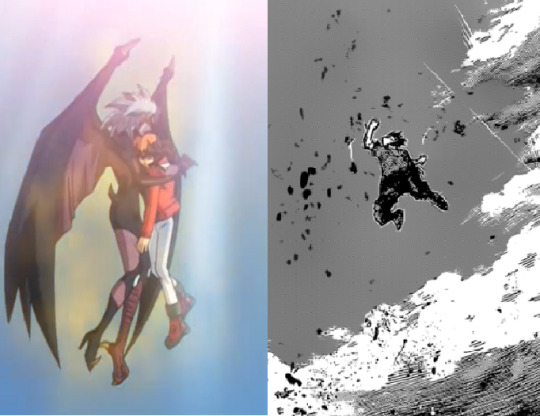
SHIGARAKI VS. YUBEL: HOW TO SAVE YOUR VILLAIN
The failure of Deku to save Shigaraki isn’t just a tragic conclusion for Shigaraki’s arc, it’s also My Hero Academia failing as a story. When I say the story failed, I mean the story has failed to answer any of the questions it asked its audience. It’s themes, character arcs, everything that communicates the meaning of the story to the audience is no longer clear.
Saving Shigaraki was the central goal of not only the story itself, but the main character Deku. By failing in its goal you can’t call this a good ending. In order to illustrate why this goal of saving the villain is so important to both Deku’s character and the central idea of MHA, I’m going to provide a positive example in Yu-Gi-Oh GX were the main character Judai successfully saves their villain. One of these stories fails, and the other succeeds. I will illustrate why under the cut.
BROKEN THEMES = BROKEN STORY
When artists draw they have to consider things like perspective, anatomy, shading, light, coloring. Drawing has rules, and it’s hard to produce good art without knowing these rules beforehand. If I draw something that has bad anatomy, you can criticize me for that.
Writing has rules, just like drawing. The rules of storytelling are important because writing is an act of communication. You can write whatever you want, just like how you can draw whatever you want, but if you break the rules the audience won’t understand what you are trying to communicate.
When I refer to MHA as a broken story, I am referring to the fact that it has broken the rules of storytelling. As this youtuber explains.
“I guess we should first define what broke and broken even means in this context. Has the story turned into an unintelligible mess? Not really. Value judgements aside, the narrative is still functional and fulfills the criteria of being a story. So how can a story that still functions be broken? Maybe to you it cannot. But to me a story that is still functional isn’t enough. What I mean when I say MHA is broken is that it’s lost something crucial. A codifying style of structure, pacing and payoff that until a certain point was the core of its identity.”
I could launch into a long-winded explanation of what themes are, but for the sake of simplicity I like to define themes in terms of “Ask, and answer.” The author asks a question to the audience, and then by the end of the story provides an answer. The audience is also invited to come up with their own answer which prompts them to think about the story on a deeper level. The question both MHA and GX are asking both its main characters and the audience is “Can you save the villain?” with the additional complicated question of “Should you save the villain?” This post will detail how both stories go about answering those two questions, and more importantly why those answers matter for the story.
With Great Power… You know the rest.
My Hero Academia and Yu-Gi-Oh Gx are actually similar stories once you get past their superficial differences. MHA is a story with way better worldbuilding, compared to a society where everything revolves around the trading card game, and people go to school to be better at a trading card game.
However, if you get past that. They are both bildungsroman, stories about the main characters growing up into adults. They both have an academy setting where the goal is for the main character to graduate and enter the adult world. They are both shonen manga. GX is the sequel of Yu-Gi-Oh a manga that ran in Shonen Jump the exact same magazine as MHA. The biggest point of comparison is their main characters, who both start out as young and naive who are driven by their admiration of heroes. Deku is a fan of All Might who wants to become a hero despite not having a quirk, because he loves All might who saves everyone with a smile. Judai’s entire deck archetype revolves around “Elemental Heroes’ and later “Neo-Spacians” who are all based on popular sentai heroes like ultraman.
The central arc for both characters is to grow up. Growing up for both of them not only requires figuring out what kind of adult they want to be, but also what kind of hero they want to be.
Now I’m going to drastically oversimplify what a character arc is.
A character arc first starts out with the character being wrong. Being wrong is essential because if the character is right from the beginning, then there’s no point in telling the story. A character often holds the wrong idea about the world, or has some sort of flaw that hinders their growth. The narrative then needs to challenge them on that flaw. It usually sets up some kind of goal or win condition. That flaw gets in the way of a character “winning” or achieving their goal, so they need to fix that flaw first. If their ideals are wrong, then they need to think about what the right ideals are. If they’re too childish, they need to grow up. If they have unhealthy behaviors or coping mechanisms, they need to unlearn it and require better ones. Otherwise, that flaw will keep sabotaging them until the end.
I’m borrowing the word “win condition” from class1akids here because it’s an incredibly appropriate terminology. Midoriya needs to do “x” in order to win, otherwise this victory doesn’t feel earned. The “x” in this case is usually character development. As I said before, a story where the main character hasn’t changed from beginning to end feels pointless. Especially in Deku’s case, he was already a brave, strong hero who would charge right into battle and defeat the bad guys in chapter one, so him defeating Shigaraki in a fist fight doesn’t represent a change.
The story sets up not only “What does the hero need to do to win?” but also “How does the hero need to change in order to win?” A character either meets these requirements before the end of the story, or they don’t and usually this results in a negative ending.
MHA in its first half quite clearly set up both the final conflict of saving the villains, and also that saving the villains is its “win conditions.” The hero shouldn't be allowed to win without first fixing this flaw.
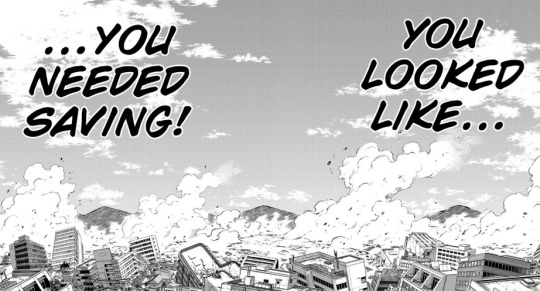
From this panel onward the central question Deku is forced to answer shifts from “Am I strong enough to defeat ShigarakI” to “Can I save Shigaraki?” However, much earlier than that All Might goes on to basically set up the win conditions of what makes the ultimate hero as someone who “Saves by winning, and wins by saving.”
All might: You can become the ultimate heroes. Ones who save by winning, and win by saving.
Therefore the story has set it’s criteria for what kind of hero Deku needs to become. If he wins without saving, then he’s failed to become what the series has set up as the Ultimate Hero.
Shigaraki and Yubel aren’t just narrative obstacles, or boss monsters to be killed like in a video game. They are narrative challenges, which means that the character can’t grow in any way if they don’t answer the challenge presented by the characters. They are villains who actively resist being saved, to provide a challenge for two heroes who define their heroism by saving others. The challenge they pose adds a third question to the story and the main characters.
"Can I save the villain?"
"Should I save the villain?"
"If I don't save the villain, then can I really call myself a hero?"
In other words the decision they make in saving, or not saving their final antagonist defines what kind of hero they are. In Deku’s case it’s even more critical he defines what hero he wants to be because the MHA is also a generational story, and several of the kids are asked to prove how exactly this generation of heroes is going to surpass the last one. The kids growing physically stronger than the last generation isn’t a satisfactory answer, Deku getting strong enough to punch Shigaraki hard is not a satisfactory answer, because we are reading a story and not watching a boxing match.
I’m going to focus on the last two questions though for a moment. Many people who argue against saving villains like Shigaraki argue he is a mass murderer and therefore isn’t worthy of salvation. However, the act of saving Shigaraki isn’t a reflection of Shigaraki himself, but rather the kind of hero Deku wants to be. It all boils down to Spiderman. In the opening issue of Spiderman, teenage Peter Parker is bitten by a radioactive spider and suddenly gains super strength, the ability to stick to walls along with other powers. However, being a teenager he uses these powers selfishly at first. He doesn’t feel the obligation to use his powers for other people, and therefore when he sees a robbery happening right in front of him he lets the robber go. However, because he lets the robber go, the robber then attempts to hijack a car and kills his Uncle Ben in the process. If Spiderman had stopped the robber then he might have prevented that from happening. He had the power to stop the robber, but he didn’t feel responsible or obligated to save other people. As a result Uncle Ben dies. It’s not enough to have power, ti’s how you use that power that reflects who you are, therefore: “with great power comes great responsibility.”
The choice to save Shigaraki actually has little to do with whether or not Shigaraki is redeemable, but rather how Deku chooses to use his power, and what he thinks he is responsible for reflects who Deku is as a person. Deku himself also clearly outlines how he wants to use his power, that One for All is a power for saving, and not killing.
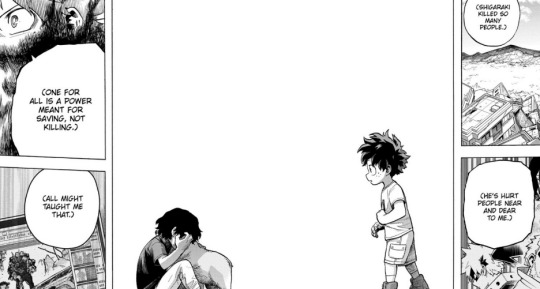
How he uses his power reflects Deku’s ideal in saving others, and therefore if he doesnt use his power to save, then he’s failed to live up to his ideals. It's not whether it's morally right to save a murderer like Shigaraki, but rather the way Deku wants to choose to use his power. It's about whether he feels the responsibility to save others.
Judai explores an incredibly similar arc to Deku. They are basically both asked what kind of responsibilities a hero is supposed to have, which is also a metaphor for growing up to handle the responsibilities of adulthood. As both characters start out with incredibly naive and childish ideas about what a hero is. Therefore realizing what a hero is responsible for is key to them growing as a character. However, Judai is different from Deku. In some ways he’s more like Bakugo. Judai is a prodigy who’s naturally good at dueling. He doesn’t duel to save others, but rather because duels are fun and he’s good at it. He’s very much like Bakugo, who admired All Might as a hero just as much as Deku did, but admired the fact that he was strong and always won rather than he saved others.
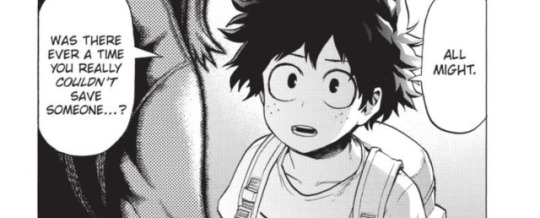
However, I would say both Deku and Judai are questioning what a hero is responsible for. They are both asking if they have the responsibility to use their power to save others. If they have to fight for other people, just because they have power. His first big challenge as a character comes from Edo Phoenix, who calls out Judai for not thinking through what it means to be a hero, and what responsibilities heroes carry. Judai duels because he thinks it’s fun. He will show up to duel to help his friends, but that’s because he’s the most powerful person in the group. Even then it’s because he finds fighting strong opponents to be enjoyable. Bakugo will beat up a villain, but for him it’s more about winning then if the action will save someone or not.
Judai is more often than not pushed into the role of being a hero, he doesn’t play the hero because he’s a particularly selfless person, and he’ll often avoid responsibility if not forced. He has power but no sense of responsibility and the narrative calls them out as a problem.
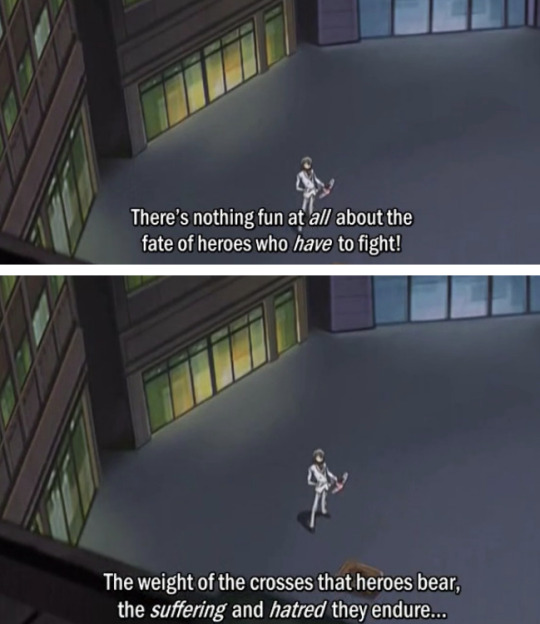
Edo: Can you even fathom that, Judai?
For Judai, he can’t understand the responsibility of being a hero. For Deku, he idealizes heroes so much he can’t understand that there are people out there the heroes have failed to save. These two callouts towards Deku and Judai are discussing similar because they’re both discussing where a hero’s responsibilities lie. Is a hero responsible for saving everyone? Is someone strong like Judai responsible for using their strength to help other people?
Judai’s arc continues into the third season where he’s not shown to just be naive but ignorant. He’s not just childish, he actively resists growing up because he doesn’t want to take on adult responsibilities.
THe same way that Deku just decides not to think about whether or not All Might failed to save people in the panels above. However, in Judai's case he's actively called out for his choice to remain ignorant.
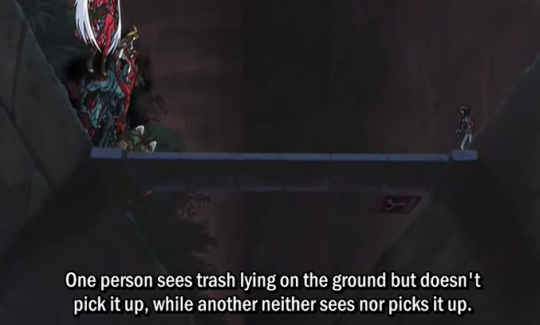
Satou: Now, which one is at fault? Judai: Isn’t it the guy who saw it, but didn’t pick it up. Satou: Not quite. If one is aware of the trash that fell, it may be picked up someday. But there is no possibility fo the unaware one ever picking it up. Judai-kun you are the foolish one unaware of the trash that has fallen. Judai: Are you calling me out for how I am? Satou: Your behavior towards me was atrocious. The worst was attending class only for credit, even if you were there you only slept. Judai: Yeah, I know. I was all bad, but it wasn’t that big a- Satou: It is important. You see, one by one, the students inspired by your attitude were losing their motivation. Now if you were a mediocre duelist, then this would not be an issue. Satou: However, you are the same hero who defeated the three mythic demons. Every single student in the academy admires you. You should have been a model for this academy. Judai: Me, a role model? Are you kidding? I just do whatever I feel like doing. Satou: Great power comes with great responsibility. Yet, as you remain unaware of that, you’ve spread your lethargy and self-indulgence.
seems like a minor issue, but look how Judai responds to the accusations. “I just do whatever I feel like doing.” Satou is arguing that Judai should pay attention to the influence he has on others because of his power, because how he chooses to use that power affects others. However, Judai chooses to actively not look at the consequences of his actions because he doesn’t want to take on that level of responsibility, and therefore he’s looking away from the trash.
While it seems like it doesn’t matter in Satou’s specific example, not thinking of the consequences, or how you use your power can have unexpected consequences. Spiderman doesn’t feel like it’s his responsibility to stop a bank robber, and that bank robber shoots his uncle. You could still argue it’s not Spiderman’s responsibility to stop every crime in the world, and I guess no one owes anyone anything from that point of view - but Spiderman failing to act responsibility had the consequence of directly hurting someone else.
Spiderman has to live with that consequence because it was his own Uncle that was hurt. This is where we really reach the duality of Judai.
In GX, Judai is, symbolically speaking, The Fool of the Tarot Deck, the Novice Alchemist — a person brimming with infinite potential, yet one who is also supremely ignorant, who walks forward with his eyes closed and often unknowingly causes harm in his great ignorance. In this, he is very much the embodiment of the faults we most commonly associate with teenagers — selfishness, recklessness, shallowness, a lack of dedication or empathy when it’s most needed. Like most people, he has good traits that work to balance out some of the above, but his narrative path through GX ends up being that of the flawed hero undone by his faults — and then that of the atoner, the repentant sinner. In his case, the mistakes of his teenage years are the catalyst for his growth from a boy into a man burdened with duty and purpose. Judai is someone with infinite potential, with great power, but also ignorant on how he should use that power, and that makes him an incredibly flawed hero who needs to learn how that power should be used.
Deku similarly exists in a society where heroes deliberately turn a blind eye to the suffering of a certain type of victim. Shigaraki’s speech heavily resmebles Satou’s speech about garbage on the side of the road.
Shigarali: "For generations you pretended not to see those you coudln't protect and swept their pain under the rug. It's tainted everything you've built."
Deku shares Judai’s ignorance, because he’s not only a part of a system that doesn’t even see trash on the side of the road, but he also worships heroes so much that he’s incapable of criticizing them. If Deku saw the flaws of heroes, but at first didn’t have the courage to speak out, but eventually gained the courage that would be one thing. However, if he doesn’t see the flaws of heroes, then the problem will never be fixed.
There are also consequences for both Judai and Deku failing to use their powers responsibly. These consequences take the form of the villains who came about because of all of society’s ignorance to the suffering of victims (Shigaraki) and because of the main character’s ignorance to their suffering (Yubel). Shigaraki and Yubel are also explicitly victims that the heroes failed to save, turned into villains who are active threats to the heroes.
Should I save the villain?
The answer is yes, because the decision to save is reflective of the kind of hero each character wants to be. Each story clearly sets up that Deku and Judai aren’t punisher style heroes who shoot their villains, they are being set up as heroes who save. Deku needs to “save by winning.” As for Judai, a big deal is made of Judai’s admiration for another character Johan who represents a more idealistic kind of hero. Johan unlike Judai is someone who duels with a purpose, something Judai outright says he admires because he’s empty in comparison.
Judai: Johan what have you been dueling for? See, it’s about fun for me… Well, for the surprise and happiness too. I guess I do do it for the fun. Sorry, I guess I put you on the spot by asking out of nowhere. Johan: What’s this about Judai? Judai: It’s nothing. Johan: I suppose there is one goal I have. Johan: Even if someone doesn’t have the power to see spirits, they can still form a bond with a spirit. That’s why I do it for people like him. [...] Johan: I'll fight for everyone who believes in me, and I'll do it with my Duel Monsters. Judai: I'm jealous you've got feelings like those in you.
Becoming a hero who uses their power to help others isn’t just a goal the story sets for Judai, it’s a goal that Judai sets for himself because of his admiration for Johan. Johan represents the idealistic hero Judai wants to be, but is also held back from because of his personality flaws. Johan represents the kind of heroic ideal that Deku is aspiring to be.
Johan’s ultimate goal isn’t punishing the wicked, but to use his power to save others.
Johan: Judai, it was my dream to save everyone through my dueling!
The story sets up the idea that it’s not enough for Judai to simply be strong, he’s also challenged to become a savior who uses his power to help others like Johan. Deku needs to “save by winning” and Judai needs to “Save everyone through his dueling.” However, Johan also adds another condition to what saving means. His idea of saving isn’t to defeat a villain, but rather his dream is to help connect spirits and humans together, even if there are humans who can’t see spirits. Johan doesn’t save people with the power of physical force, but rather the power of human connection.
Should I save the villain?
Here the answer is "Yes", because wants to become more like Johan someone who uses their power to help others not just for themselves. Then we reach the third question
If I don't save the villain, can I really call myself a hero?
It once again comes to power and responsibility. Heroes have great power, and they are responsible in how they use that power, if they use it irresponsibly then there are consequences. Shigaraki wants to destroy hero society, because the heroes irresponsibly use their power to turn a blind eye to everyone’s suffering.
People suffer when heroes fail to live up to their responsibilities. The entire conflict of season 3 is created by Judai failing to save Yubel. If Judai had helped Yubel when they most needed it, instead of abandoning them, then Yubel would never have been twisted by the light of destruction, would never have attempted to teleport the school to another dimension, would never have attacked all of JUdai’s friends.
These consequences matter. Deku can turn his eyes away from Shigaraki’s suffering, but let’s say a hero failed to stop a robbery, or rather he didn’t even try, and because of that his mom was shot and died in the street. Would Deku consider the man who failed to stop a bank robbery a hero? When Spiderman let a bank robber go instead of trying to stop him, was he being a hero in that moment? Both the stories and the characters themselves have defined heroes as people who use their powers to save others, therefore if Judai and Yubel fail to save their villains then they can’t be called heroes by the story’s own definition. Now let’s finally return to the question of "Can I save the villain?"
Was there ever someone you couldn’t save?
m going to start with Yu-Gi-Oh Gx as a positive example of how to save your villain. Gx works for two reasons. One, it’s established from the start that Yubel isn’t beyond salvation, and two, it makes it so Judai can’t win without saving Yubel. The conflict of the story does not end until Judai makes the decision to save Yubel. In some ways the writing is even stronger because Judai is directly responsible for the pain and suffering that Yubel went through that turned them into a villain in the first place. Yubel isn’t just a victim, they’re specifically Judai’s victim.
Yubel is a duel spirit who is also essentially Judai’s childhood friend. A duel spirit just like the kind that Johan wants to save. During their childhood Yubel got too overprotective of Judai, and started to curse his friends for making him cry or upsetting him in any way. Until everyone Judai’s age started avoiding him and Judai became all alone with only Yubel for company. Judai’s decision was to abandon Yubel at that time. He took the yubel card and shot them into space, hoping that being bathed in space rays will somehow “fix” what was wrong with them. I know that’s silly but just go with it. Judai abandoning Yubel had the unintended consequence of Yubel being subjected to the light of destruction, a corrupting light that subjected Yubel to years of pain. This pain literally takes the form of Yubel burning alive.
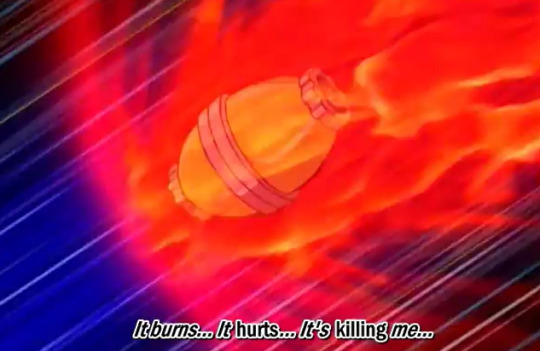
Yubel connected to his dreams called out for Judai every night, only for Judai’s parents to give him surgery that repressed his memories of Yubel causing him to forget them entirely. Yubel then spent the next ten years alone in space, continuously subjected to painful torture, with their cries for help being ignored.
"I was suffering even as you came to forget about me..."
Yubel is then met with the question of how can Judai treat them this way if they loved him so much? As from Yubel’s perspective, they’ve only ever tried to protect Judai, only for Judai to not only throw them away, but subject them to painful torture and ignore their cries for help. Judai effectively moves on with his life, goes to duel academy, makes friends while Yubel is left to suffer in silence all but forgotten. This is where Judai’s ignorance has serious plot consequences.
It’s not just the pain that Yubel endured that made them snap. It’s that their pain went ignored.
Yubel holds out the faint hope that Judai will answer their calls fro help until they finally burn up upon re-entry into earth’s orbit. At which point they’re left as nothing more than a single hand crawling on the ground. Yubel who cannot fathom why Judai would cause them so much pain, and then forget about them, convinces themselves that Judai must be causing them pain, BECAUSE he loves them.
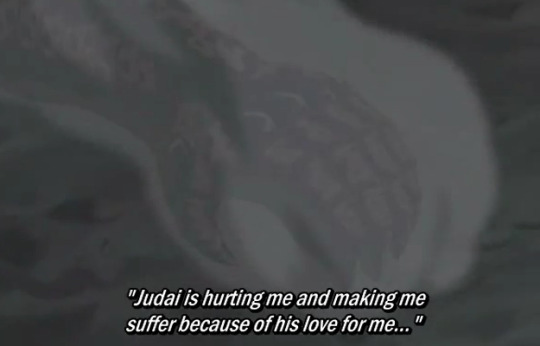
But you see, I couldn't possibly forget about you in the time that I've suffered...
Judai is allowed to move on with his life, to make friends, to spend the next ten years doing so while Yubel is subjected to ten years of agony. When they finally escape their painful torment, they see all the friends Judai has made while they’re left alone and forgotten. However, Yubel’s goal isn’t revenge. Rather, it’s to make Judai share and recognize their pain. WHich is why I said it’s not the fact that they were made to suffer, but their suffering is ignored. Yubel’s entire philosophy revolves around the idea that sharing pain is an expression of love, and that they and Judai share their love for each other by hurting each other.
"That's why I sought to fill all those linked to you, your world, with both sadness and anguish..."
For Yubel, making all of Judai’s friends suffer and Judai themselves suffer is a way of making them and Judai equals again. They want to show “their love” for Judai, but it’s more about forcing Judai to recognize the pain he’s caused them by forcing him through the same pain. Yubel’s philosophy of sharing pain is actually a twisted form of empathy.
They’re not entirely wrong either, that even people who love each other can cause each other pain, and that if one person is suffering alone in a relationship or the suffering is one-sided then there’s something wrong with that relationship.
Yubel: I get it now… You weren’t in love, with Echo. Yubel: No.. you may have loved her just enough to clear the conditions in palace for you to control Exodia, but the you didn’t truly love each other. Yubel: You were only unfairly hurting her, while you stayed unharmed. You wouldn’t suffer. You wouldn’t suffer. You wouldn’t be in pain. Amon: What are you getting at? Yubel: I’ve been hurt! I’ve suffered! I’ve been in pain. That’s why I’m making JUdai feel the same things I did!
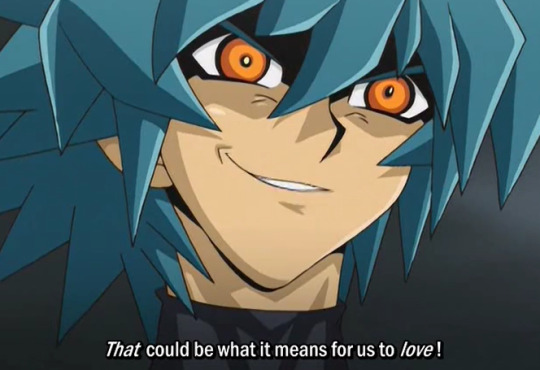
Yubel’s twisted theory of love, is a pretty thinly veiled cry for empathy.
They break out into tears when talking to Amon about the way they’ve hurt and suffered. They clearly state upfront that their goal is for Judai to recognize their love. One of the first things they say to Judai is a plea for Judai to remember them.
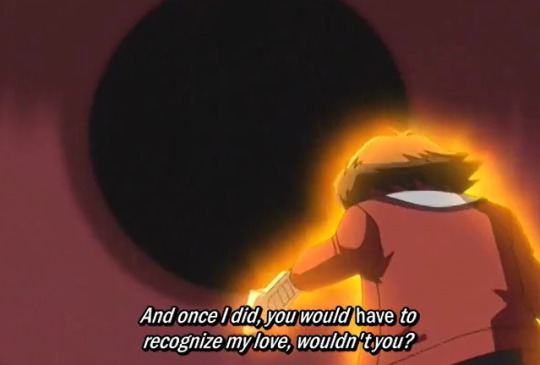
Yubel is presented as a very human character suffering through a lot of pain throughout their entire villai arc, they break down into tears multiple times, they cry out in agony, they're visibly suffering and you see their mental walls begin to break down when Judai denies them any empathy.
Yubel is actually incredibly clear and straightforward about their desire to be saved by Judai. However, Judai doesn’t lift a single finger to help Yubel the entire arc, even though they themselves admit they are directly responsible for Yubel’s suffering but they helped create who they are today.
Judai plunges into a different dimension and gives up everything to save someone, but it’s Johan, not Yubel they try to save. You have Johan, the perfect friend, and perfect victim that Judai gets obsessed over and will not stop at anything to save, and then you have Yubel, the imperfect victim that is actively harming Judai and all of his friends that Judai chooses to ignore. The whole season Judai only focuses on saving the perfect victim Johan, and this is clearly shown to be a flaw. Judai doesn’t just ignore Yubel to save Johan, he also ignores every single one of his friends.
Judai only caring about saving Johan, and deliberately ignoring and abandoning the friends who came with him to help, essentially abandoning them the way he did Yubel leads to another consequence. After he abandons them they get captured, rounded up, and actually die and become human sacrifices.
Losing his friends, causes Judai to snap. Judai becomes the supreme king and decides power is all that matters; he starts killing duel spirits en masse in order to forge the super polymerization card. Which means being left alone, suffering alone, being abandoned by everyone causes Judai to snap the exact same way that Yubel did.
In fact Judai is only saved from his darkest moment, because two of his friends sacrifice their lives, trying to get through to him and appeal to his humanity. At that point Judai’s friends could have just chosen to put him down like a mad dog, to punish him for the amount of people he’s killed, but instead they try to save him because of their friendship.
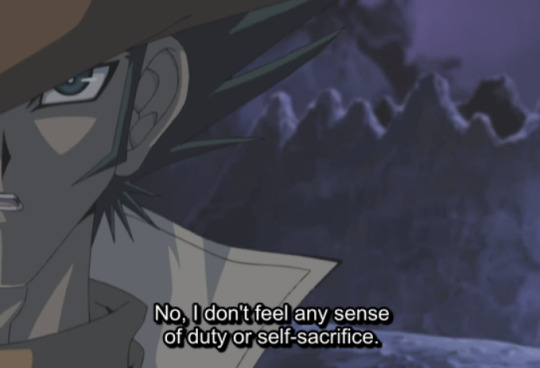
I just want to save my friend. That is all.
By the time Judai is facing Yubel in their final fight, Judai doesn’t have the moral highground against Yubel in any way whatsoever. They’ve both lashed out because of the pain they endured and killed countless people in the process of lashing out. The only real difference between them is that Judai is lucky. He had friends to support him at his lowest point, while Yubel didn’t. Does Judai learn from Jim’s example, and go out of their way to save Yubel the same way they were saved because Yubel is still a friend? Nope, Judai tries to kill Yubel at this point.
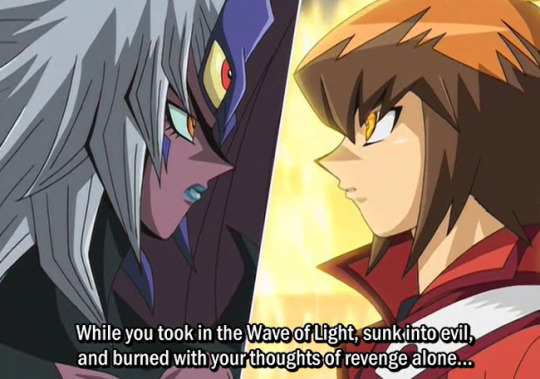
I made a lot of friends... And they all taught me something… real love is wide enough, large enough and deep enough to fill the universe. Your so-called love is only a conceited delusion.
Like, Judai, sweetie baby honey darling. How was Yubel supposed to make friends when they were floating in the empty void of space?
Judai hasn’t learned, they are still ignorant, and still turn a blind eye to Yubel’s suffering. After all if his love is wide enough, large enough,and deep enough to fill the universe then why don’t thy have any room in their heart whatsoever for empathizing with Yubel?
Judai making friends while Yubel was trapped in space doesn’t make Judai a better person than Yubel, it makes Judai lucky. Judai doesn’t even appreciate that luck, because he treats his friends like garbage. It’s not about whether Yubel is worthy of salvation, because Judai is a mass murderer and his friends still went to great lengths to save them anyway. It’s that Judai doesn’t want to empathize with Yubel, because they still want to remain ignorant and irresponsible. Judai wants to continue playing hero, with a very black and white definition of what a hero is. By this point Judai’s killed lots of people, but if he makes Yubel the villain in the situation, he can keep playing hero. He doesn’t have to look at himself and what he’s done, because blaming everything that happened on Yubel and then putting Yubel down like a mad dog allows Judai to absolve his own guilt. Judai practically ignores Yubel’s cries for help, even when Yubel spells it out for them.

I couldn't have lived with the heartache unless I felt that I was being loved...
At this point Yubel themselves acknowledges that their love was just a delusion. That it was a coping mechanism, because they couldn’t live with all the pain otherwise. WIthout it they would have just died, which makes Judai unmoved. The implication here is that Judai thinks yes, Yubel should have just died in that crater. It would have been easier for Yubel to die a perfect victim, then for Yubel to crawl out of that crater and go on to hurt other people. While that may be true the same can be said for Judai - it would have been better if Judai died rather than become the Supreme King. His friends could have put him down like a mad dog, you could have even called that justice - but they didn’t. Judai making no attempt to save Yubel isn’t because he thinks it’s morally wrong to save someone who’s killed as many people as Yubel has, or because he thinks he can’t forgive Yubel, it’s because Judai is taking the easy way out. Johan is a nice, easy victim to save, because he’s Judai’s perfect boyfriend, while Yubel is a complex victim that requires Judai to understand their suffering. Even the act of saving Johan isn’t about Johan himself, it’s about the fact that Judai feels guilt over Johan’s disappearance. What Judai wants isn’t really to save a friend, but to stop feeling guilty over that friend. Judai isn’t just disgusted by Yubel’s actions towards his friend, he also wants to avoid the guilt he feels over causing all of Yubel’s suffering, because it requires acknowledging the complex reality that he is both victim and perpretrator in this case, just as Yubel is both victim and perpetrator.
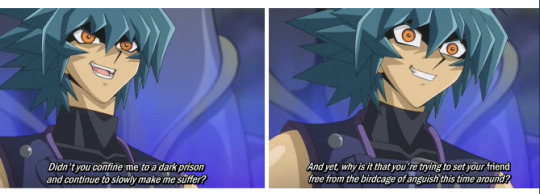
So how can an arc where Judai doesn’t try to save Yubel until the last possible minute, be better than an arc where Deku makes it his goal for the final act of the manga to save the crying boy in Shigaraki?
It’s because the story does not let Judai get away with his continual refusal to empathize with Yubel. Yubel’s entire character revolves around empathy, in the form of sharing pain. As a duel monster, Yubel’s effect is that they are a 0/0 attack monster who is immune to all damage, but when you attack them they deal all the damage back to you. Which means that Yubel will respond to all the pain they feel, by causing you just as much pain in return. Yubel is not a character who can be defeated in a fight, or a duel. In fact they’re the only Yu-Gi-Oh villain who never loses a duel once. The most Judai can do is duel them to a draw, and they draw three times. Yubel wins against everyone else who challenges them. In a way Yubel is like Shigaraki, the ultimate, unkillable enemy that can’t be done away with violence. Judai’s refusal to empathize with Yubel or attempt communication also makes them worse, every time Yubel is hurt they escalate. THe more Judai hurts them, the more they will hurt in return, it’s a cycle that will never be broken simply by killing Yubel, because Yubel is unkillable.
Not only that but the story has gone to great lengths to show that saving Yubel is the correct course of action. If Judai doesn’t save Yubel, he’s basically spitting on the selflessness Jim showed in saving him. In fact if he doesn’t save Yubel, Judai is contradicting his own words on what makes a good friend. Sho once asks Judai after witnessing his brother change, what he should do if a person you lov ehas changed into an entirely different person. What if they're a person you don't even recognize any more? A person you don’t even necessarily like anymore?
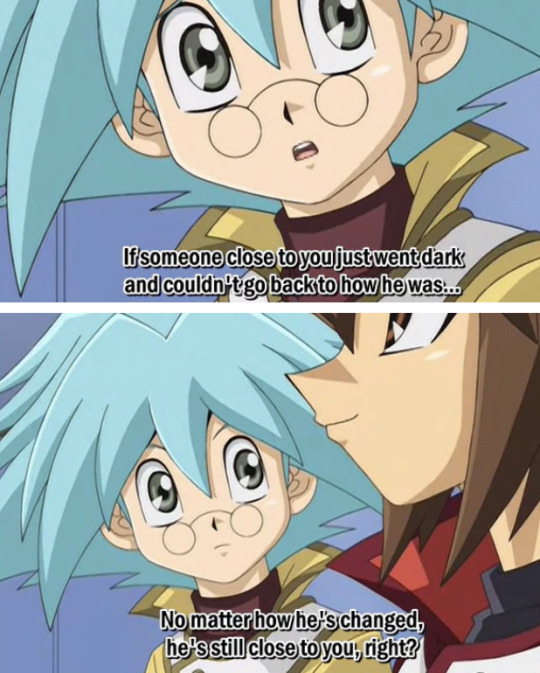
That's why if it were me. I'd probably just be looking after him until the very end, even if I didn't like him. I'd do it cause I think it'd prove that I care about him.
Judai doesn't even say that Sho is obligated to save his brother or morally redeem him, just that he has to keep looking at him instead of turning away or ignoring him.
Judai is being a bad friend, by his own definition. By choosing to deliberately look away from Yubel, Judai’s not living up to his advice for Sho for how you treat people you care about.
Which is why the resolution for Judai and Yubel’s arc is so important, because it’s done by Judai finally acknowledging Yubel’s pain, and promising to watch over them from now on, words that are followed by the action of physically fusing their souls together so they’ll never be alone again. Judai doesn’t just say pretty words about how they won’t ignore the crying child inside of Yubel, but instead he makes a sacrifice to save Yubel at risk to themselves to show their words are backed up by actions. Judai says Yubel will never be alone again, and then he commits.
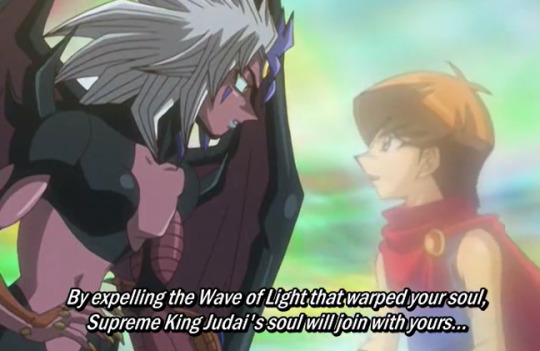
"And even if that means I won't exist anymore... I don't care."
Judai has resolved his character arc by this action, because Judai is finally taking on responsibility and that responsibility is watching over Yubel, so the two of them can atone together. Judai even says himself this isn’t an act of sacrifice on his part, but rather him finally accepting adult responsibilities.
Judai: I wouldn't sacrifice myself for you guys. I'm just going on a journey to grow from a kid into a man.
Judai needed to save Yubel to complete his character arc and grow as a person. If Judai hadn’t saved Yubel, he would have still remained an ignorant child. By learning not to turn a blind eye to Yubel’s pain, and also smacking sacrifices and physically doing something to atone for the way they ignored Yubel up until this point they’ve not only saved Yubel they’ve also done something to address their wrongs. This also continues into the fourth season where Judai’s personal growth results in him learning what kind of hero he wants to be as in Season 4 in order to atone for the spirits that Judai slaughtered, he decides to leave his friends behind and walk the earth with Yubel helping spirits and humans get along with each other. In fact Judai’s final speech as a character isn’t even about how strong he is as a hero, but how weak he is as a person.
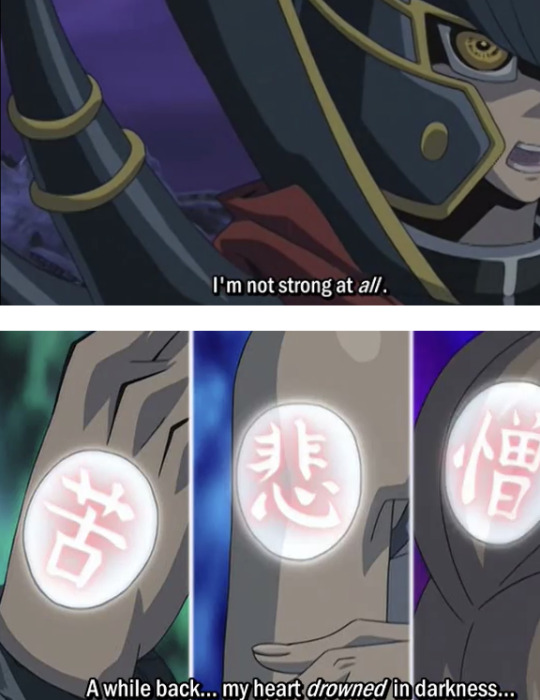
And I put my friends through some rough times. Form that, I figured a few things out... all I can do is believe in them.
The lesson Judai learned is because he’s weak, he needs to empathize and believe in other people the same way that his friends once believed in him when he was at his lowest point. Judai’s not the strongest hero, he’s the weakest one, but that gives him the ability to empathize with people who were lost just like he was, and guide them back from the darkness.
The story of how Deku became the worst hero.
I’m going to say this right now it might turn out next week that Shigaraki is just fine, and he’ll use the overhaul quirk to reconstruct his body. However, even if that happens Deku has completely failed at his goal of saving Shigaraki for the reasons I’ll illustrate below. In theory, Deku’s arc of saving Shigaraki, and therefore winning by saving should be much easier for the story to accomplish and also much less frustrating to watch. After all, Shigaraki has been around since the beginning of the manga, he’s literally the first villain that Deku faces. He’s also the first villain that Deku talks to, where he brings up the idea that there were some people All Might failed to save. There’s also many intentional parallels between the two characters, the entire manga is about their parallel journeys of becoming the next generation hero and the next generation villain. Shigaraki even directly quotes the line at one point that all he wanted was for someone in his house to tell him he could still be a hero, the same line Deku said in the first chapter was that he wanted his mom to tell him to be a hero instead of apoalogizing to him for being quirkless.
Not only is the setup for Shigaraki and Deku made obvious (Deku can redeem Shigaraki by telling him that he can still be a hero too), but Deku himself states out loud that he wants to save the crying child inside of Shigaraki.
Judai runs away from Yubel the whole time, whereas Deku is running towards Shigaraki and actively makes it his goal to understand Shigaraki and continue to see him as a human being rather than a villain. The story also makes it clear that saving Shigaraki is necessary to saving hero society as a whole. After all Yubel is just Judai’s victim. Whereas Shigaraki is the victim of all of society. He’s the crying child who was ignored. The cycle won’t be broken if heroes continue choosing to ignore people like Shigaraki, because more victims will grow up to replace him.
Shigaraki: Everything I've witnessed, this whole system you've built has always rejected me. Now I'm ready to reject it. That's why I destroy. That's why I took this power formyself? Simple enough, yeah? I don't care if you don't understand. That's what makes us heroes and villains.
Shigaraki rejects the world because the world continues to reject him. THe solution to this problem is not rejecting Shigaraki, because Shigaraki won’t go away, the system will just continue to reject people like Shigaraki. As long as heroes and villains don’t understand each other, they’ll keep being forced to fight and the conflict won’t end, because hero society is what engineers it’s own villains.
clear as day by the story itself. If the objective of saving Shigaraki is clear, then how exactly did the story fail in this objective? What went wrong? In this case it’s a failure of framing, and breaking the rules of “show don’t tell.” Stories are all about actions and consequences. When a character makes a certain action in a story, the way other characters around them, the world, and whatever consequences that action frames that action in a certain light. It provides context for how we are supposed to interpret that character in that moment.
For example, when a character does something wrong and another character directly confronts them over what they did wrong, that frames them as in the wrong. The story is criticizing the character for what they did wrong. Context is everything in a story. Stories are just ideas, so they require framing and context to communicate those ideas for the audience. Certain character attributes can be strengths or flaws depending on the context. My go to example is that if you put Othello in Hamlet, the conflict would be resolved in five seconds because Othello’s straightforward personality and determination would have him kill Hamlet’s uncle without questioning things. Whereas, Hamlet constantly questioning and second guessing himself would lead to the worst ending possible. However, if you put Hamlet in Othello, then Hamlet wouldn’t fall prey to Iago’s manipulations, because Othello doubts and questions everything so he wouldn’t believe Iago the way Othello did.
Hamlet’s contemplative and introverted nature can be a strength in one situation, and a flaw in another. Othello’s tendency to act without thinking things through can be a strength in one situation, and a flaw in another. Context matters, because context tells you how you’re supposed to interpret a certain characters actions, and therefore tells you more about that character. This is why people repeat “Show don’t tell” as the golden rule of storytelling, it’s one thing to say something about a character, it’s another to us the characters actions in the story itself to show them something about the character.
What’s even worse then breaking the rules of show don’t tell however, is telling the audience one thing, and then going onto show in the narrative something completely different. In that case the narrative becomes muddled and confusing to read. If I the narrator say “Hamlet is someone who overthinks everything” and then in the story Hamlet walks up to his uncle and kills him with no hesitation, then the narrator is straight up unreliable. It becomes impossible to tell as an author what message I’m trying to get across about these characters, because I’m telling you one thing and showing another.
This is why the writing fails in the second half of My Hero Academia because we are constantly told one thing, but then the story shows something entirely different and sometimes even contradictory to the thing we are being told.
Judai is a much worse hero than Deku, he always runs away from Yubel, and we’re never directly told that he’s supposed to save Yubel either. However, the narrative is incredibly consistent. Judai’s behavior of running away is consistent with his character. All the other character call Judai selfish for abandoning his friends (and they’re not even talking about Yubel). Judai is never painted in any positive light for his actions, therefore we as the audience understand Judai’s behavior is wrong and he needs to fix it. The narrative makes it clear that Judai needs to grow up, and Judai is never rewarded for his refusal to grow up, he’s ruthlessly chewed out, not by his enemies but also by his own friends. However, the narrative isn’t merciless on him either. Season 3 of GX is dark, but it’s not grimdark. Even when Judai loses his way, he’s still shown love and compassion by those same friends who go to great lengths for his sake. The narrative criticize Judai but it never insists that he’s beyond redemption and needs to be put down like a mad dog.
The message is very clear, that not only does Judai need to grow up, but he also deserves the chance to grow and change, which is why he should give Yubel a similar chance. In comparison the story sets out this clear narrative arc for Deku of understanding Shigaraki, but it never challenges him for failing to understand Shigaraki. If you listen to what the narrative says, how other characters describe Deku, and what Deku himself says and only read it on a surface level then yes, Deku’s goal is to save Shigaraki. If you analyze actions however, he is in effect just like Judai he never takes any meaningful action or steps towards Shigaraki, nor does he think of what saving Shigaraki might look like or entail.
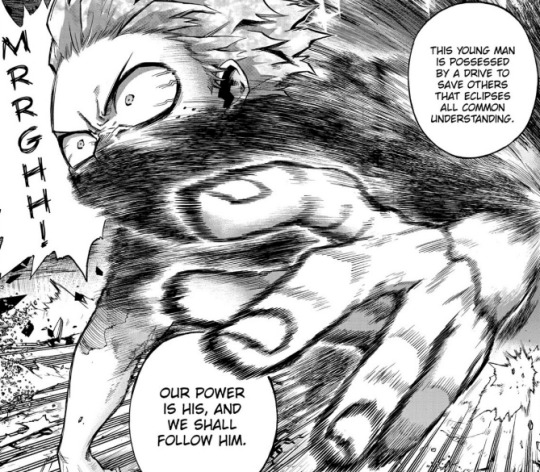
The story describes Deku as someone who is possessed by a drive to save others that eclipses all common understanding, but does the story give us any examples of that behavior?
Judai is characterized as a selfish, irresponsible child, and the story gives us countless examples of his immaturity and how it hurts others. Does the story of MHA do the same for Deku's purported virtues? Let’s run through Deku’s actions, step by step, the actions themselves and how they are framed in order to find any evidence that Deku possesses this drive to save others. Does Deku reflect at all on the question of:
Can Shigaraki be Saved?
Deku leaves on a journey to try to understand villains. When he makes a perfunctory attempt to understand and empathize with Muscle, and Muscle replies that some people are just evil does Deku keep trying to reach his heart? Nope, he just punches him.
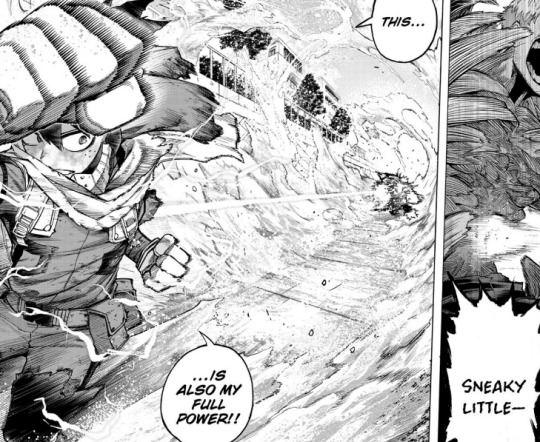
Well, if he’s failed in his goal of understanding a villain then does the story call him out on his failure? Does Deku face any sort of narrative consequence for that failure? Is he framed negatively for failing to understand Muscle, the same way that Judai is framed for abandoning Yubel? Nope. Deku doesn’t express any frustration at all over is inability to reason with Muscle. There’s also no negative consequence for Deku just choosing to punch muscle, it turns out that there was no reasoning with Muscle and some people are just bad eggs so Deku was right. It’s okay for characters to fail, but if a character fails and it’s not framed by the story as a failure then the writing itself as failed. Why even bother to include this scene in the first place if it doesn’t advance Deku’s character in any way? This scene in spite of showing Deku failing to understand someone actively paints Deku in a positive light, because of how much stronger he is ow that he can OHKO a guy that gave him trouble all the way back in the camp arc.
This scene doesn’t tell anything about Deku as a character, it just makes him look cool. In fact that’s precisely the problem, Deku isn’t adequately challenged as a character, because he’s never allowed to fail. Even when he does obviously fail at the things the narrative set out for him to do, he’s never challenged on those failures, because the priority isn’t to make Deku grow, it’s to make Deku look good. As I said before, Judai is the hero because he’s the weakest. Deku is the hero because he’s the strongest. Well, next a big flaw on Deku’s part is that he worshippd the same heroes that were making the world corrupt. Heroes like Endeavor who created people like Dabi. So, does Deku take action to either criticize the older generation of heroes, or separate himself from them in order to try to be better than them? Nope, he teams up with them. Not only that, Deku can’t do something as simple as tell Gran Torino out loud about his plans to save Shigaraki. If Deku feels that Shigaraki is worthy of salvation then he should at least try to make an argument here about his ideal of saving others.
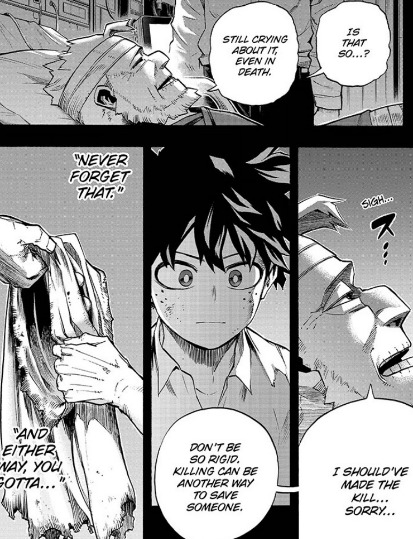
Now here’s the thing, if Deku hadn’t directly looked at the camera and told us he wanted to save Shgiaraki, would we be able to deduce his intentions from his actions? If you took away all of Deku’s internal monologue, and just showed him punching Muscular and saying nothing when Gran Torino says he may have no choice but to kill Shigaraki would anything about Deku’s actions indicate that he wants to save Shigaraki? Let me use avatar the last airbender as a positive example for a moment. People say that Aang’s desire to spare Ozai’s life comes out of left field, but like if you analyze Aang as a character down to their bending, and the way they react in situations they always prefer de-escalation, or taking a third option as opposed to confronting things head on. It’s literally why Toph says Aang has trouble learning earth bending, because as an airbender, he always tries to look for some other way to solve the problem, instead of a direct confrontation with force. As early as season one, Aang tells Zuko someone who has tried to kill him several times that he was friends with someone from the fire nation one hundred years ago and in a different situation they could be friends. Aang’s desire to save the Firelord may not have been told to us until the last possible minute, but Aang’s aversion to violence has always been a part of his character from the beginning. However, Deku never shows any similar aversion to violence. There’s basically no example where he ever tries to de-escalate a situation, or he avoids a conflict by seeking a third option.
Anyway, let’s move onto the next example. In the confrontation where Lady Nagant fights Deku, when Deku learns the fact that the heroes were employing government hitmen to attack people for uhh… exercising free speech does Deku give any reaction to this information? When Lady Nagant says that Deku is only going to bring back the status quo, does he show her any meaningful evidence that he won’t do that.
Deku’s response is because the world is so grey, he needs to extend a helping hand to others. Which you know what thay could be a response. Deku saying that his response to the corruption of the hero world is that he now understands that society led some people down the wrong path, so his way of addressing the wrongs of that society is lending a helping hand to as many people as possible even people he used to think was irredeemable.
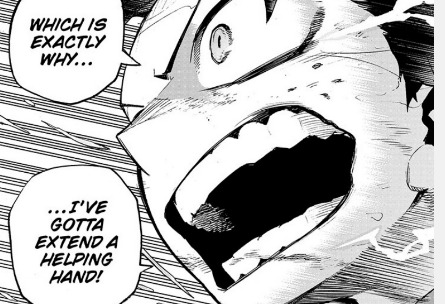
I will give Deku the benefit of the doubt, I think this is an acceptable answer. I can’t save everyone, but that’s not going to stop me from trying to save as many people as possible and maybe I can save people who were this society’s victims on the way too. However, does Deku demonstrate his resolve to extend a helping hand in any meaningful way.
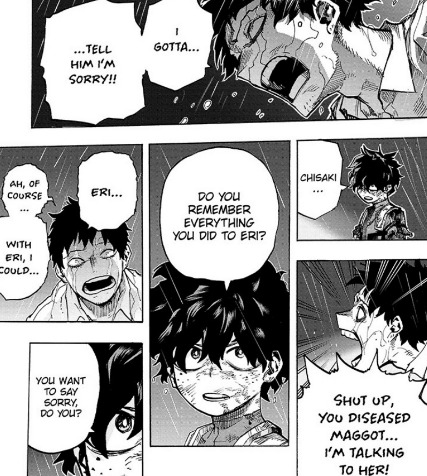
Deku is met with an armless, insane Overhaul who’s begging for someone to help heal his father figure in the Yakuza from his coma. This isn’t like Muscular who insists that there’s no helping him, Deku is met face by face with someone asking him for help. Deku’s gotta extend a helping arm whenever he can, because he knows some people were abandoned and led astray by this society… Unless that person is someone he doesn’t like personally. At which point he only helps them on a conditional basis. We are told Deku will save anyone and everyone, but Deku is met face to face with an armless man who is begging for help and Deku’s does nothing to help him. Deku’s not criticized for refusing to help overhaul either, it’s never brought up again. When Deku begins to experience a mental breakdown because of all the people he’s trying to help in the Dark Deku arc, we are told this is the result of Deku trying to save everyone, but we do not see Deku attempting to save a single villain after Muscular and Nagant.
He exhausts himself beating up villains that AFO sends after him, and only helping innocent civilians. Which would be fine if this arc were about how Deku is running away from his real responsibilities the same way that Judai was running, but that’s not what we’re being told. We are told that this is all part of an arc of Deku learning to understand villains and be a hero.
Deku is asked “Can you save Shigaraki?” by the story, but Deku never at any point has to deliberate on that question. Judai doesn’t deliberate on that question either, but him choosing not to think about things and stay ignorant is the point.
It’s actually fine to make Deku stagnate as a character. It’s fine to have him take the easy way out by just punching villains and giving up on them after one conversation. It’s fine for him to be empathetic to other people’s suffering, or even self-righteous. It’s fine for him to be ignorant.
He could be all of those things if it was a part of a narrative teaching him to unlearn his behavior. In fact the narrative might have been better if Deku started out by saying he didn’t want to save Shigaraki, that there was no choice but to kill him, because then at least his actions would be consistent with his words. Then his lack of empathy and his tendency to resort to violently beating up villains instead of avoiding violence would be character flaws he could work on. Deku however, is presented to us as this empathic hero who is always willing to give others a second chance though he never actually sticks his neck out in order to do so. Continuing on with our slow crawl through MHA, one of Deku’s friends is revealed as the traitor. Deku has a heartwarming scene fo saying that Aoyama can still be a hero, but look at his actions. He lets the adults in the room physically tie Aoyama in a straightjacket and imprison him, for the crime of… doing bad things while he was in a hostage situation. Apparently, if a bank teller helps the bank robber by giving them money when the robber has a gun to his head, the swat team should just snipe the bank teller. Not only does he not defend Aoyama against the adults, or stand up for him, or tell the adults they’re wrong to treat Aoyama a clear cut victim who had a gun to his head and was bing held hostage like he’s a villain - he also lets the adults use Aoyama an innocent victim as bait in order to lure out AFO. Deku tells Aoyama he can still be a hero, but he doesn’t defend Aoyama as a victim of being taken hostage, nor does he stop the adults from further taking advantage of him and throwing him right into danger. Some people are just led the wrong way that’s why they need to be extended a helping hand, but fuck Aoyama I guess. He needs to earn the right to be sympathized with by physically putting his life in danger.
Deku can’t even go out of his way to save a friend who he’s known for the better part of a year, when that friend is a complex victim forced to do bad things.
Then Deku and Uraraka have a conversation where they both, kind of ruminate on the idea that maybe the villains are human beings who are worthy of sympathy.
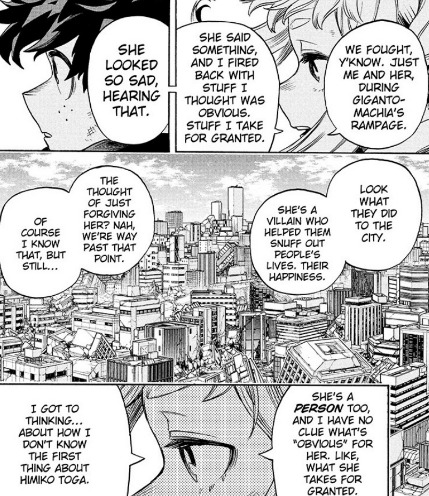
In fact Uraraka is actively trying to dehumanize Toga by looking at the destroyed city, so she won't have to think of Togaas a person.
The language here is also a major fault of this arc. It focuses far too hard on “forgiveness” over and over again. As I said before, saving Shigaraki isn’t about Shigaraki at all, it’s about Deku, and how he wants to use his power as a hero. Deku has even stated himself that he doesn’t believe that OFA is a power that should be used for killing people. So why does whether Toga or Shigaraki are forgivable or not even matter? It’s the same with Deku refusing Overhaul any sympathy. If he’s so morally opposed to abusers, then why does he work with Endeavor and defend him at every visible opportunity, even in front of his victims? Whether or not Deku can forgive Shigaraki doesn’t matter, because Deku is not the moral arbitrator or right and wrong. In fact Deku doesn’t even have any morals, so how is this a moral debate? Is there any point where Deku gives a clear definition of what he thinks right and wrong is? Does he quot Immanuel Kant to the audience?
Batman doesn’t kill people, not because he thinks that every last person on earth can be saved, but because Bruce Wayne an incredibly rich white man thinks that maybe he shouldn’t have the authority to decide who lives and who dies. When Bruce doesn’t kill the joker, it doesn’t mean he thinks the Jokers actions are forgivable, it’s because Bruce thinks it’s not his place to determine whether someone has the right to live.
The whole conflict that MHA presents us is that heroes pick and choose who to save, and only save the ones they deem as innocent. So, how does Deku saying repeatedly they can’t forgive Shigaraki contribute to that theme in any way? In fact by focusing on forgiveness, rather than whether or not he personally has the right to pick and choose who lives and who dies Deku is ignoring the elephant in the room. The question isn’t about whether Shigaraki’s redeemable or if his deeds should ever be forgiven. The question is whether Deku has the right to decide who gets saved and who doesn’t.
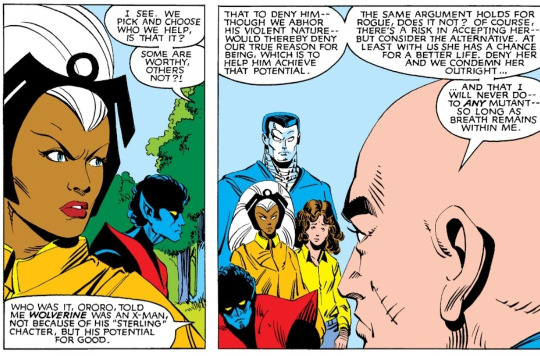
We are told that Deku as a character is someone who wants to save everyone no matter what, so Deku shouldn’t be focusing on whether or not Shigaraki is worthy of forgiveness, he should be making an idealistic argument like Xavier does in this panel. Why doesn’t Deku talk out loud with Uraraka on how he believes his power is for saving others, and not killing? If he’s meant to represent some idealistic hero, then why doesn’t he even talk about his ideals? Why don’t I as the reader know what those ideals are?
I think Xavier’s ideals of forcing the X-men to provide a good example to the mutant community, in order to try to earn the respect of other human beings is wrong, but at least he has ideals. He tries to inspire the other people around him to live up to those ideals. The story can criticize him for his ideals and point out how they’re wrong, while it can also uplift parts of his idelogy like where he believes there are no evil mutants. Deku has a chance to do the same to Uraraka, to tell her clearly, “I don’t think we as heroes have the right to pick and choose who we help…?” but he waffles. Not only does he waffle, but this moment is meant to be read as an indication that both Deku and Uraraka are sympathetic individuals who want to save their villains. They are supposed to look good and idealistic here and they don’t. For Deku it just seems like a repeat of his behavior with Overhaul. The only villains that are worthy of sympathy, are the ones that he personally decides are forgivable.
The story isn’t about whether or not it’s moral to save someone who’s killed as many as Shigaraki has. The story never seriously discusses any sort of complex morality or moral philosophy. Once again to bring up avatar, yes you can argue Aang sparing the life of a war crimminal is bad, but Aang mentions on multiple occasions that he wants to retain the cultural values of the airbending people. Aang has a morality, a consistent morality, it might not be a morality you personally agree with but at least he has one. Deku hates abusers, unless he’s next to Endeavor then he thinks abusers should be given the chance to atone. Deku doesn’t believe that One for All is a power for killing, but he never stands up to any of the adults who are blatantly trying to kill Shigaraki, he doesn’t even express out loud to Uraraka that he doesn’t think heroes have the right to decide who lives and who dies. In fact he’s given the perfect opportunity to, when Hawks kills a villain and it’s broadcast live on the news in font of everyone, but Deku never has anything to say about that. The reason Deku and Uraraka both put such an emphasis on “forgiving” their villains has nothing to do with the story itself. It’s because the author Horikoshi, is afraid that some people will misinterpret his story as saying that he actually thinks that saving a villain like Shigaraki means that he condones mass murder, so he has to have the characters talk about not forgiving Shigaraki.
Judai doesn’t have any consistent morals either, but once again that’s the point and something the story relentlessly calls him out on.
Cobra: Fortune would never smile on a fool like you who fights while prattling on about enjoying duels. Cobra: You are certainly a talented duelist. But you have one fatal flaw. Judai: A fatal flaw? Cobra: Yes, your duels are superficial. Someone who fights with nothing on his shoulders, cannot recover once he loses his enjoyment. What a duelist carries on his shoulders will become the power that supports him when he's up against the wall! Cobra: But you have nothing like that! Those who go through life without anything like that cannot possibly seize victory.�� Cobra: But I know that nothing I say will resonate with you... because you have nothing to lose but the match. Judai: I... Cobra: Afraid aren't you? Right now, you have nothing to support you.
Judai’s regularly called out for his superficiality. Judai is only a hero because he’s strong and wins fight, he doesn’t feel any responsibility towards other people, and in fact he loathes having to feel responsible for others. Judai isn’t just naive, he deliberately chooses to remain ignorant. Since he’s ignorant of his own faults, he makes awful decisions when it comes time for him to lead, and his friends die because of choices he made. We are told that Deku doesn’t want to remain ignorant, that he wants to understand villains, but Deku’s actual actions are him continuing to ignore society’s ills and the suffering of victims. In fact if you take away Deku’s internal monologue and the narration, Deku’s actions almost exactly mirror Judai’s.
Deku is just as superficial as Judai, and he also doesn't want to spend any time thinking about what kind of hero he wants to be, but the narrative never punishes him for it.
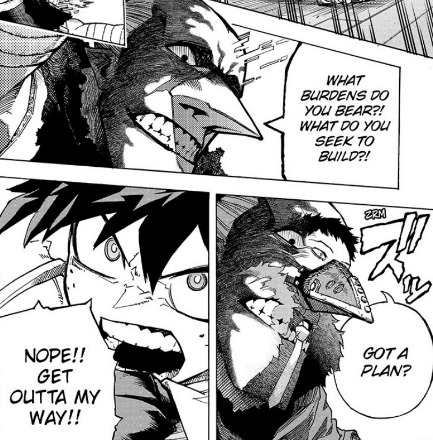
Judai is asked what burdens he has to bear and he has to meaningfull answer that question, Deku is allowed to get away with not having to think about anything. Deku remains superficial. Both Judai and Deku spend the entire arc running away from their villain rather than confronting them in any meaningful way. They both never express out loud any sympathy for their villain, or try to empathize. THey both never step down from the role of hero, and only confront their villain as a hero, because they don’t want to think about themselves as complicit or in the wrong. Shigaraki and Deku’s final confrontation mirrors Judai and Yubel’s but without the same clear framing. THe entire time Yubel is trying to get Judai to empathize with them, and Judai only responds with physical violence, because they don’t want to stop being the hero and because they can’t see Yubel as anything other than the villain. As soon as Deku arrives on the battlefield (by the way everyone else and their mom pointed this out, but Deku who doesn’t think OFA is a power for killing, is completely okay with a plan called the “Sky coffin plan” where every other hero was clearly trying to murder Shigaraki).
When Deku arrives he asks if Shigaraki is still in there, but he doesn’t do anything to try to reach Shigaraki, he jumps right to punching him. In fact he never tries anything besides punching him as hard as possible. How is punching Shigaraki with the force of a thousand suns saving him exactly? How is that different from how he tried to defeat Shigaraki the last war arc, before he saw the image of the crying child that made him want to try a different approach in saving Shigaraki? In Judai’s final fight with Yubel, it’s made explicitly clear that Judai is not trying to save Yubel, and that’s a fault on his part. In fact Judai gives the traditional “I have friends, and you don’t” speech to Yubel but it’s a subversion of how that speech is usually used. Usually that speech is used to show that the protagonist won because of they valued friendship,while the villain treated their friends poorly and only cared about power. However, it’s ironic in this case because Judai got all of his friends killed. Judai treats his friends like garbage. This speech isn’t used to show that Judai is winning because he values his friends more than Yubel does, it shows that Judai is a hypocrite, playing the hero in this situation where they are just as bad as Yubel. Judai’s not morally superior, he’s just lucky that he has good friends. Friends that were willing to save him. The only connection Yubel has to anyone else, Yubel’s only friend is Judai and Judai is a shit friend.
In fact, Mirio tries to give a version of the “You don’t have any friends” speech to Shigarkai, only for Shigaraki to get mad and tell Mirio that he does have friends and people he wants to protect.
This fact is also something that is blatantly ignored by Deku, even though Mirio tells him about it… even though we are told that Deku is trying his best to see the humanity in Shigaraki.
Judai blatantly admits they’re trying to kill Yubel. Which makes them a worse person, but a better character than Deku, because their actions are clearly framed by the narrative and consistent.
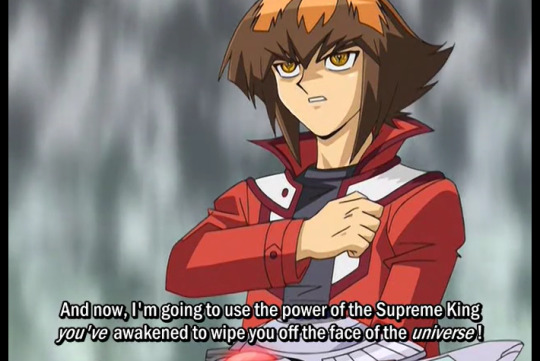
On the other hand we are told that Deku doesn’t want to kill Shigaraki, and yet everything Deku does makes it look like he’s just trying to kill Shigaraki and put him out of its misery. If we didn’t have Deku stating out loud that he wants to save Shigaraki and wants to see him as a human, there’d be nothing in his actions to indicate that he’s trying to avoid killing Shigaraki. Deku says he can’t pretend he didn’t see Shigaraki crying, but like, does he ever hesitate to punch Shigaraki, does he ever think that causing Shigaraki more harm is wrong when he’s already suffered so much? Deku says that Shigaraki is a person but does he treat him like a person? Does he try to talk to him like a person? To use avatar again, Aang does talk to Zuko pretty early on. Deku doesn’t even give the classic “We could have been friends under different circumstances” speech. When Shigaraki resists Deku’s attempts to see him as a person or emapthize with him, Deku’s response is to just resort to punching harder.
Which is in effect the same thing Judai does to Yubel, just kill them as a villain so they don’t hurt anybody else, but framed in an entirely different light. Judai is shown to be ruthless, and cold in his attempt to only settle the conflict with Yubel by violently putting them down. On the other hand we’re being told that Deku is compassionate and empathic while he punches Shigaraki with the force of a thousand suns.
There’s another eerie similarity between both of these final confrontations. At the climax of the confrontation, both Judai and Deku have a psychic vision where they see events from Yubel and Shigaraki’s childhood. This vision is supposed to help both characters understand the good in the villain they’re facing.
Let’s see the contents of this vision and how the visions change each character. Judai is shown a vision of his past life where Yubel sacrifices their entire body, and even their humanity to go through painful surgery to turn into an ugly dragon, all for the sake of protecting Judai in a previous life.
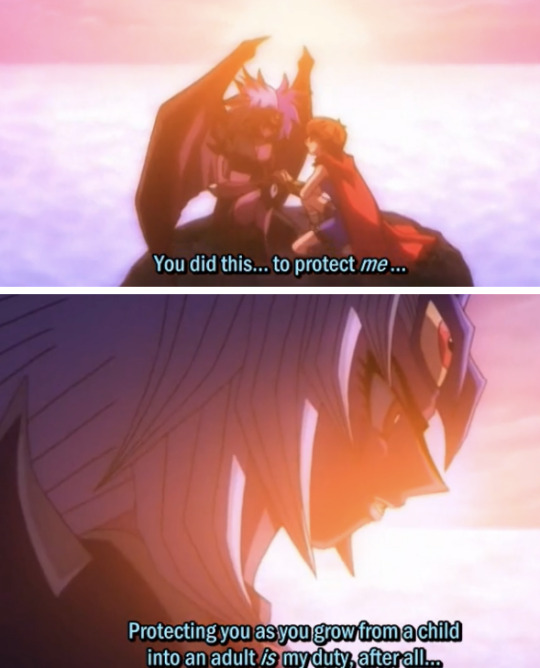
Judai is then forced to witness the good side of Yubel they’ve been ignoring all along to paint them as a villain. Yubel is simultaneously extremely selfish and willing to hurt people Judai cares about, but they’re also extremely selfless and will do anything to protect Judai and have made great sacrifices in the past for Judai’s sake. Deku gives lip service to not ignoring the humanity in Shigaraki, but Judai is literally forced to acknowledge the humanity in Yubel. Not only that, but Judai changes his behavior immediately after learning this new information. After seing the sacrifice that Yubel made for him in the past, Judai responds with a sacrifice of his own. A sacrifice that perfectly mirrors the sacrifice that Yubel once made for him. Yubel gave up their humanity for Judai, so Judai fuses his spirit to Yubel’s, becoming a human / spirit hybrid so Yubel no longer has to be alone.
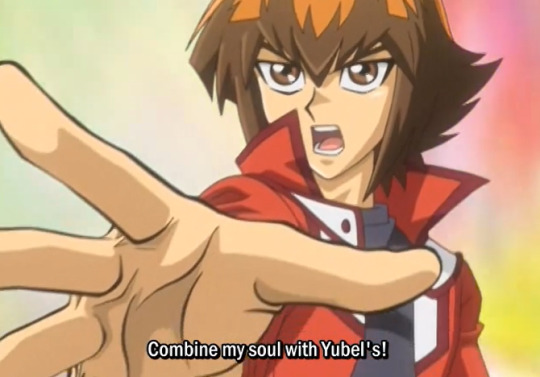
Judai also doesn’t just fuse their soul with Yubel’s in order to stop Yubel from destroying everything, it’s because both of them at this point need to atone together, and Judai is fulfilling his responsibility of watching over his friend until the end to prove that you care about them - as he said to Sho. Judai’s also fulfilling Johan’s dream of helping repair the bonds between spirits and humans, by reconciling with Yubel and repairing their bond. It’s also Judai atoning for his previous behavior of abandoning Yubel, by choosing to stay alongside them as they both atone together. Deku does sacrifice OFA during the fight against Shigaraki, but their sacrifice isn’t to help Shigaraki, but rather doing psychic damage to Shigaraki by using OFA is the only way to defeat them. He transfers OFA in order to break Shigaraki’s brain so he’ll stop reissting and Deku can beat him down. Judai fuses their soul together with Yubel out of empathy and a responsibility they feel to help their friend fater abandoning them, Deku transfers One for All to Shigaraki in order to hurt him and make him easier to punch. It's funny that Deku doesn't travel to Shigaraki's mind to learn more about him, but instead with the specific intent of harming him.
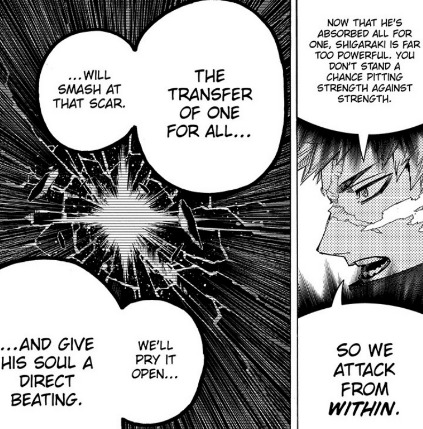
Once he's inside Shigaraki's mind, he doesn't take time to reflect on how Shigaraki used to stand up for bullied kids, or how he wants to be a hero to villains because no one else will stick up for the outcasts in society. No, he only care about Shigaraki when he takes the form of a child crying for help.
In the aftermath of the psychic vision Deku’s behavior doesn’t change towards Shigaraki in any way either. You could say he sacrificed his own arms in order to try to comfort Shigaraki within the depths of his own mind - but that’s not a real sacrifice either because his arms immediately come back. When Judai learns about the sacrifice that Yubel made in a previous life towards him, he stops seeing Yubel as an enemy and finds a way to resolve things peacefully between them. When Deku lanterns that Shigaraki’s a victim of All for One, and that his entire life was a lie, when he sees Shigaraki’s suffering first hand does his beavior twoards Shigaraki change in any way?
When he sees Afo has taken over Shigaraki’s body again, does he try to shout for Shigaraki, to tell Shigaraki to fight from the inside, to reassure Shigaraki that he’s still in there that there’s still good in him? Nope. He just punches Shigaraki some more.
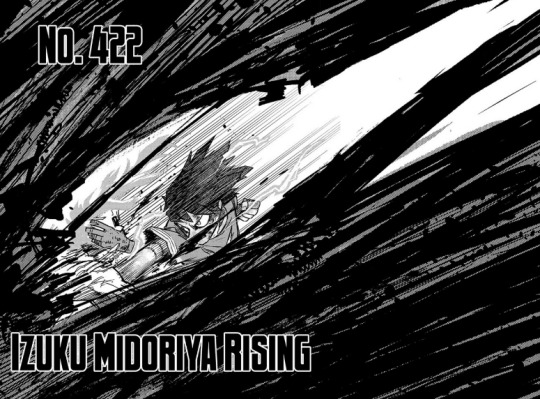
What Deku needed to tell Shigaraki is so obviously set up by the narrative too. Shigaraki wanted just one person in that house to tell him he could be a hero. Deku wanted his mother to tell him he could be a hero if he was quirkless. Deku sees that Shigaraki started out as a boy who wanted to be a hero, and who was manipulated into being a villain but does he try to appeal to the boy inside of Shigaraki by telling him he can still be a hero? Does he now see the good in Shigaraki? Nope, he just tries to kill him by punching him really hard.
I purposefully chose the images for the banner of this post, because it shows how differently MHA and GX treated its villains in the end. Yubel is embraced by Judai in the end, Shigaraki evaporates into dust.
"Judai, now that our souls have become one we will never be separated again. I have now been filled with your love and power. Let us fight together, against the wave of light leading this universe to destruction!"
Shigaraki could so easily have been given the love and empathy that Yubel was shown, but instead their life ends with no show of empathy from Deku, and with them dying believing that their long life of tragedy meant nothing in the end. Shigaraki realizes he's a crying kid, but he's never comforted.
Shigaraki: I only stole my body back from Master, and I didn't destroy anything. "In the end, I was just as you said... A crying kid, huh?"
Yubel is embraced and comforted, Shigaraki disintegrates into nothing.
One of these stories is apparently an optimistic story about heroes saving people, but it ends with the lifelong victim being killed in the most nihilistic manner possible, never receiving comfort, and never achieving anything with his long life.
The other story is a silly anime about card games, shows that when people are alone and suffering they can lash out and do terrible things. That all people are weak especially when they're alone, but the solution isn't to abandon them, or condemn them for their faults, but to believe in them and help uplift them the same way that Judai decides to uplift Yubel so they can atone together.
Which is why Deku gets an F in being a hero. Go directly to summer school. Do not pass Go. Do not collect $100.
#mha meta#ygo meta#mha 423#bnha 423#mha 423 spoilers#bnha 423 spoilers#izuku midoriya#deku#shigaraki tomura#tenko shimura#judai yuki#yubel#soulshipping#yu gi oh gx#yu gi oh
760 notes
·
View notes
Text
Each time I think about how they took out the Goldy Pond arc, I get so angry. Cause like not only was it a good ass arc, getting rid of it takes out something integral to the story as a whole, that I just don’t think they realized/cared about:
The validation of Emma’s beliefs.
Emma is established to be this happy-go-lucky character right? And as the children are still in Grace Field, you see that she still keeps this demeanor while juggling the new graveness of the situation she is in. While losing some of her naivety, she still shows herself capable of being someone hopeful for the future who will not let her circumstances get the better of her. The most important part of what makes this WORK for her character (instead of making it annoying and unrealistic) is the fact that she both acknowledged and experiences the tragedy of the world she is trying to be hopeful in. It’s not some little girl being like “I believe everything’s gonna be fine! Sparkles and rainbows!” while being shielded from the darker parts of the world. It’s a little girl who looks in the face of the darkness and that terrible world and is in the MIDST of it. It’s a little girl who found the dead body of her younger sibling and was faced with the reality that her whole life was a lie. It’s a little girl who realized her whole family was going to die and fought to grab onto her hope despite how overwhelmingly bleak their situation was. She knew and yet she didn’t hesitate to believe that they could escape. She knew and still wanted to yell to the world that she was going to save EVERYONE. Seeing someone so unwaveringly hopeful even after being hit with devastating loss and despair is like a beacon for anyone else struggling to keep surviving. Emma is lovable for how she loves—how her hope and determination stands fast in the face of adversity and still goes forward even as more events threaten to shake and bend it.
For whatever reason season 2 was changed the way it was (I’ve heard many things)(if it was because of the guns then WHY pick up the anime in the first place bc you derail EVERYTHING) it could never stand completely without Goldy Pond.
Goldy Pond is in plain terms Emma’s defining arc. It seems to be pushing forward a question whose answer will define the rest of the series.
“Who is Emma?”
Not as she is with her siblings. Not as she is when there is her family there to keep her going. Who is Emma, and how will she grow from here on out?
Goldy Pond is the first time Emma is “alone”. She has none of her siblings around her and she is in an unfamiliar environment, with people she does not know. People by all means unconnected to her when she has a family to get back to and protect.
But Emma doesn’t treat them that way. She cares for each stranger she meets, jeopardizing her safety by using herself as bait—by charging forward into battle to protect them and change the demons’ focus. As the arc progresses and she meshes herself into the other children’s ranks, treating them as family as well, it seems to be clear what the answer is. As she serves as a distraction in this main fight. As she reminds them of details of HOW they can win this fight even when there seems to be no hope left. When she gets empaled and STILL takes a shot to kill Duke Leuvis.
Emma is hopeful and kind and self-sacrificing. She treats strangers as she would treat her family, and cares for all lives the same. She is so overwhelmingly forthright and sincere in her emotions and love, that you can’t help but want to support and follow her. That is who Emma is. She is not naive. She has seen death and battle and bleak circumstances but still rises to the challenge EVERY time — and most importantly this time was the bleakest so far. This time she was “ALONE”.
She has the experience behind her to make her care for all things “valid”. This is not a silly, childish little girl not knowing all the different aspects of her declarations. She says they will survive and you can take her for her word because she knows what it’s like to be near death. But specifically and more crucially for Goldy Pond (and therefore the rest of the series): Emma says that she wants to save demons. And with Goldy Pond, you can take her word for it.
When Norman declares that his way of saving everyone is to have a demon genocide, the most important part of this is that we as the readers support Emma and her viewpoint (that the demons should not be killed.) Her viewpoint is valid in the manga because of what she has gone through. Emma says she wants to save demons and we can take her for her word because she has experience at the hands of some of the worst cruelty from demons possible. She and other children were hunted for sport. She was placed in a mockery of a sanctuary and hunted down for demons entertainment—not for the demon’s hunger or survival but for FUN. And she still turns around and says that she believes there are GOOD demons.
Without this, Emma has nothing in her experience for her to stand toe to toe with Norman’s beliefs. She looks like a naive, silly child trying to justify a foolish dream when she has experienced nothing of the world. It’s practically an insult to Norman and his experiences and it doesn’t give off what it should to the watcher. How are we supposed to believe in Emma (and go against a GENOCIDE) when it seems as if the writers want to paint that the genocide is the reasonable answer (when it fucking ISNT). And this is all because without Goldy Pond, Emma doesn’t have the experience to be meaningfully hopeful. She can’t properly value her positive experience with Mujika because she doesn’t not have a big enough negative experience to weight it against (and gracefield isn’t good enough bc Norman has gone through more than that). For Emma to have weight, she needs to be able to weight the good and the bad and STILL choose good. To still choose to be hopeful and caring.
Getting rid of Goldy Pond got rid of such an important foundation of Emma as a character and I can never forgive them for that.
#and besides that like all the stuff we missed???#no badass goldy pond fights#or all of those characters#AND NO COOL FIGHT OSTS#Yuugo my bunker dad how they have wronged you#give Emma a gun#not me emma#the other Emma#season 2 was also lackluster in animation and pacing#there was just so many things wrong with it#emma tpn#tpn ray#norman tpn#tpn#tpn manga#tpn yuugo#tpn lucas#the promised neverland#ynn yuugo#yuugo#yakusoku no neverland#goldy pond#ranting
195 notes
·
View notes
Text
I unfortunately saw something I didn't want to see and that was my last straw. I'm fucking doing this.
Let's establish this first. Alastor is stated in the show to be asexual that is not up to discussion. He is also very heavily implied in the same conversation to be aromatic. 'An Ace in the hole' being used in context of him being with Charlie is also implying his aromanticism.
VIDEO
If that's not enough then here is Viv speaking about his romantic orientation. It's pretty clear despite the fact that afterwards she said it's okay to headcanon whatever (it's not but I will get o that later) that he is written purely as an aro ace character.
On top of that going by Alastor's interaction with Angel from the pilot and the first episode it is clear that he is sex repulsed. Not only that but on the fandom website he is stated to be touch averse with two sources which you can check out on the website.
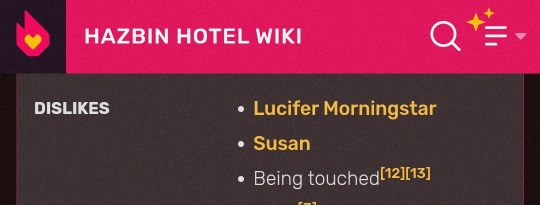
Hazbin hotel wiki, Alastor page
Now we established that Alastor is canonically Asexual, Aromantic, Sex Repulsed and Touch Averse
As I also am all of the above I'll try to explain everything to the best of my ability as simply as I can.
Aromanticism and Asexuality.
I'm probably targeting the audience that knows those terms but regardless I will explain it anyway.
Aromantic - people that experience little to no romantic attraction towards any gender
Asexual - people that experience little to no sexual attraction towards any gender.
Little to no
Asexuality and aromanticism are spectrums in which people can feel certain attractions towards people but those attractions are less occurring or are defined by personal connection.

Diagram from AVEN website
However some people are at the end of the spectrum, they never felt attraction and that's valid. Alastor was stated to be aroace he wasn't written as demi or as gray he was written as aroace as in the end of the spectrum. His repulsion and not giving shit about romance or sex speaks for itself.
Representation
I do understand that everyone wants to be represented but it's so important to understand that aroace people are one of the most underrepresented queer groups in the media.
And I'm not here to scream about how I want my fav character to be just like me I don't care for it I'm way too confident in my orientation to rely on that however I'm tired of explaining to people what asexuality and aromanticism is just to receive 'are you sure' or 'you'll change your mind' or 'its not real' or the community favourite 'you'll find the right person' no I won't I'm not looking thank you very much (I just smile and nod to be polite and I'm sick of it).
'Harmless' buts like: 'He might be on the spectrum', 'AroAce people can still feel attraction' hurt the final outcome for all the people on the spectrum not only strictly aroaces because it allows people to write one shots with 'Demi Alastor' that falls in love in 2000 words because he is 'demi' (spoiler alert: they don't understand what that label means). It's just a cover, an opening, sneaky way to disregard his orientation, feel good about themselves and move on. Newsflash there is no moving on for aroace people it's our life.
Shipping
Shipping is just harmless fun right? Usually yes but not in this case. In the same way its not okay to ship gay characters with genders they are not attracted to.

It's erasure and since there is much less people identifying on aro/ace spectrums then there is gay or bi people our voices are being silenced. Not to mention that gay people received support from entire LGBTQIA+ community over the years in contrast to aro/ace specs who to this day are told that we are 'not queer enough' or 'not oppressed enough' often by other queer people.
And finally... FINALLY we get cannon Aro/Ace character that is clearly not interested in romance and sex. Character that beats stereotypes of boring and timid aro/ace people and what's the first people do? They ship him. Alastor's storyline provides so many points to be explored like 'what is his backstory', ' what's about his deal', ' how does he fit in in the found family trope' , 'does he care about hotel guests' yet people choose to write about the only thing that he is not interested in. As a heavily repulsed person that used to be horrified about the fact that I'll have to fall in love with somebody at some point before I found out what aro/ace is I find it repulsive and trust me he would too.
But Viv said it's okay!
Its the same point once again. What if Viv said that it's okay to ship gay Angel with woman. She doesn't have authority to say shit like that.
Queerplatonic relationships
I can't tell you not to do it I don't think he would be necessary interested in it but for fuck sake do your research and try to understand what queerplatonic means before you use it as a cover to shamelessly ship him. Respect the fact that he is sex repulsed and touch averse and you're fine.
Why can't you just avoid it?
First of all I shouldn't have to. Alastor's orientation should be respected in the fandom like any other orientation is. Second of all I've tried. I tried to only look up AroAce Alastor tag I've blocked over 80 people on tumblr alone (I just counted) to avoid to see anything that could trigger me and I'm not talking about slightly shippy posts or fanarts I'm talking about full blown disregard towards his orientation. Guess what it didn't work!
Archive of our own where do I start. I've used this website for over a decade and I could probably count days I didn't go there on my fingers. I'm fluent in AO3 I know which tags I should block. I know how to skim thorough the summary and tags to see if I'm interested. I've seen shit I'm a shipper I've been on ao3 for ten years but never had to mentally prepare myself to face queerphobia as I click on the tab.
Just use aro/ace Alastor tag.
I do and let me tell you people can't tag for shit or they just pretend to be clueless at this point. Besides see this?




there is more ff with Alastor/reader (disgusting) than there is Alastor with his canon orientation and to play the devils advocate for arophobic people there is more Angel/Alastor then his stated in the show sexuality. I understand that fandom goes back before the show was aired but Viv confirmed his orientation back then too.
Summary
I could go on and on bout different issues and maybe I will in the future but I'm not wasting anymore of this weekend on it. I'm ready to answer any questions as long as they are respectful.
I'm aware that he is a fictional character, it doesn't affect him in any way whatsoever but it does affect aromantic and asexual people keep it in mind.
If there are any mistakes grammar related I'm not sorry I'm fluent in English (not my first language) but I took 3h nap in between and I'm sleep deprived.
Have a nice day.
527 notes
·
View notes
Text
Things Itachi Would Find Attractive
Someone with an impressive track record. Itachi is a true fan of great ninja figures; he spent much of his childhood reading everything about them. So, someone with a remarkable history or achievements would definitely pique his curiosity.
A confident person. Not necessarily in terms of appearance, but someone who is firm in their actions—clear, decisive, and unwavering in their behavior.
Someone who thinks outside the box. You don’t need to have a genius-level IQ, but if most opinions on a subject are predictable and you suddenly present a fresh perspective, you’d definitely catch his attention.
An elegant individual. While Itachi doesn’t have the strictest fashion sense in Konoha, like any Uchiha, he gravitates toward darker tones. Still, someone with a refined and polished appearance would certainly stand out to him.
A devoted person. Coming from the Uchiha clan, where love is arguably the strongest emotion, Itachi deeply values devotion and loyalty—perhaps even to the extent others might see as excessive. He would cherish the idea of binding his soul to someone else’s, no matter the circumstances.
A brutally honest person. Itachi isn’t good with hypocrisy or white lies. Like many Uchiha, he sees things in black and white. Honesty is something he values highly and finds deeply attractive.
A natural leader. Itachi is used to dealing with half-hearted leaders or those who hesitate to take charge. Someone who steps up confidently to solve problems immediately and decisively would be incredibly attractive to him.
A brave person. Whether ninja or not, Itachi would be drawn to someone courageous. This doesn’t mean someone fearless, but rather someone who faces any situation head-on despite their fear.
An intelligent and/or cultured person. This doesn’t just refer to mathematical or scientific intelligence (although that counts, too). Any form of intelligence—musical, athletic, intuitive, emotional—would captivate him. He’d also appreciate someone who can hold a variety of conversations effortlessly or someone who admits their ignorance on a topic and listens attentively.
Someone true to their principles. While he appreciates flexibility and a willingness to learn, Itachi admires people who stay loyal to themselves. A strong character that defends personal beliefs would win his heart.
An honorable person. Honor can be a tricky concept to define, but within the context of ninja clans, it becomes clearer. Someone who refuses to be bribed, cheat, or act deceitfully would gain his respect and admiration.
#itachi uchiha#itachi x reader#itachi uchiha headcanons#itachi#uchiha#naruto headcanons#naruto#sasuke uchiha#akatsuki#itachi headcanons#headcanons
103 notes
·
View notes
Text
izuku x f!reader. reader is referred to as wife, he is referred to as husband, reader has a defined and briefly mentioned career. wife guy deku compilation indeed.
Hey, have you seen this?
Your screen lights up with a text message from one of your closest friends, another message with a link to a video following quickly after and you tilt your head to the side at your desk reading the title of the video.
“Deku Wife Guy Compilation”
It makes you chuckle to see these terms stitched together, something that would probably not make much sense to your blissfully offline-as-he-can-be husband, but you understand what it means and press the link to open the video. It takes a moment to load and you jiggle your foot impatiently as it does, abandoning what you were last working on to focus as he comes onto the rectangle screen.
“My wife is the best,” filters through your phone speakers as clear as day and you smile despite yourself, the familiar butterflies you get every time you look at him blooming beneath your ribs.
“First of all, I want to thank my wife.”
“My wife is the true savior in our household, she’s a doctor…”
“My beautiful ____, my wife, my heart.”
“None of this would be possible without my wife so please give her a hand.”
It’s a three minute video stitching together every time he has mentioned you in victory speeches and press interviews and the like and it makes you wonder what people could be saying. You’re no stranger to running into the stray hater online yet you scroll down to the comments section, eyes widening when you see it filled with nothing but admiration for the strong foundation of love your marriage is built upon.
iluvchargebolt: man, i hope i’m loved like this someday :’)
momospantyliner: The way his eyes light up when he says her name at 0:48…beautiful.
Allmightisalright07: Reminds me of how i used to talk about my wife when she was still with us. They are certainly soulmates.
In comparison to other comment sections you’ve scanned in the past, this one makes you feel very warm in comparison and you feel the need to look away after being perceived by so many people who don’t even know you. Izuku’s love is so evident for you even strangers see it from a mile away, they can hear it in the soft way his tongue caresses your name like he’s kissing you every time he says it.
You put your phone down and turn back to your work, letting the video play over the speaker just to hear his voice when your screen lights up again and vibrates on top of your desk. Another text from the same friend, another link.
There are 10 of these omg
Another link pops up on your screen in a blue bubble, this time to a playlist containing videos in the same fashion as the first. Deku Wifeguy Compilation 1-10. Giggling to yourself, you press play and let the playlist run, each video growing in length with the shortest at 3 minutes and the longest at just over 10, your eyes widening realizing that he loves you so much there are videos worth of him simply stating it over and over and over again.
The same compulsion that led you to check the comments section on the first video takes over and you decide to pause the playlist and read, scanning the comments for anything you could potentially use as fodder to be angry about later.
shotopleasereturnmycalls: damn…i really am single.
Redriotsarmpithair9680: Love like this is rare. So glad our beacon of hope has a safe place to land after he’s done keeping us safe <3
You don’t dare to go any further lest you do see something you won’t like, keeping the video paused and locking your phone to set it aside and reflect. It’s strange to live a life so public and private all at once, hiding some parts and sharing the others, but you’re grateful the most consistent thing about Izuku is that he has never wanted to do anything but shine his light on you, to make you the spotlight of his world and everything about him.
Abruptly you pick your phone up and slide the screen upward, the messages app filling your screen. You click out of the thread with your friend and into the one with Izuku and you type out three simple words, the ones that you feel all day every day.
You: I love you.
Miles away, he looks down at his phone screen and snaps a quick picture of himself grinning, scrunching his nose, freckles barely visible thanks to the low light and bad angle but it’s all him - silly and sweet and sincere. He sends it off with the three simple words he feels about you in return, all day every day.
Izuku: I love you too, my perfect wife.
1K notes
·
View notes
Note
I appreciate how Spire knows and uses our pronouns, number one ally Spite (well Ghilan'nain uses romanced Taash’s correct pronouns too which I find so funny when they could’ve just framed the sentence differently, “I’m an eldritch horror bent on world domination but I’m not a transphobe what the fuck”)
i think spite is having a kind of objectively hysterical experience with gender here, in that... okay so if you believe mary kirby’s bluesky word of god then spite has no concept of what it looks like, or appearances at all. we are seeing it as lucanis’ mind perceives it, which is as what lucanis thinks he himself looks like (always in armour, never relaxed). and i rlly believe spite only gets he/himmed in veilguard because lucanis projects his appearance onto it and then makes the straightforward if a bit limiting assumption that something that looks like him is a he. this happens a lot to spirits e.g. justice gets automatically he/himmed because he ends up in kristoff and anders’ bodies, despite not having had much choice in either matter and canonically expressing curiosity about the new perspective being in a “female body” might offer. you could make the argument that spirits become what they’re believed to be and probably are affected by these interactions, but it’s more complicated than that, spirits do have individuality, and i think it would be obviously quite lame and bad if the form they end up in, and others’ thoughtless assumptions about it, defined everything
i don’t think spite objects to being he/himmed but i also don’t think that means spite necessarily has a gender. it just doesn’t have an opinion here. i’m not convinced spite knows what gender is. (i think we constantly need to lower our expectations on everything spite is actually aware of. i mentioned this before but i cannot express this enough: it doesn’t know why it and lucanis need to have skin.) all of which goes to say, in response to your ask, that i really don’t think spite is even capable of misgendering someone when it does not understand the situation here and is likely borrowing directly from what it probably thinks are the completely fucking arbitrary rules in lucanis’ head rather than comprehending any of this at all
(this is part of why i have made a habit of using it/its for spite even though i think he/him is generally used in the game. i think that’s more interesting in terms of exploring what spirits are, plus just easier to differentiate from lucanis while writing, plus i genuinely do not believe it’s invested in any of this. or at least i think it has not yet figured out enough to be invested in any of this. maybe it could do! spite is such a baby spirit with so much room to grow as it develops a place for itself in the mortal world. rook lucanis spite gender discussion is very funny and sweet conceptually to me, especially because i do not think lucanis has really thought about this either.)
i don’t know who ghilan’nain even gets her news on rook’s paramour from. but she’s up to date! i don’t think it’s that surprising though, i don’t know why ghilan’nain would be transphobic. there’s no reason to assume ancient elven society was like that afaik. i mean, they came directly from, and were led by, spirits who crafted their own bodies the way they wanted them. you couldn’t really describe any of the evanuris as cis exactly?
113 notes
·
View notes
Note
Why do you refer to yourself in your bio as a "biological dysphoric female?"
the short: "biological female" and "dysphoric female" are phrases coined by terfs to be transphobic, and there was a movement for trans women to take them from terfs as our own.
the long: sex is fucking fake. gender is just sex. i know this makes a lot of people, cis and trans, mad, but shit is not real. sex as society uses it is the scientific application of gendered oppression. "biological sex" has been a method of misogyny for a long, long time. (side note, biological sex has also been a used to enforce racist, ableist, homophobic and intersexist thought).
saying something is "scientific" is "bigoted" or "fake" always seems to throw people through a loop. but "science" is not a neutral concept. a scientist with a bigoted agenda will skew results to affirm their bias. the easiest example of this is transphobic/homophobic studies that conservatives point to that when you dig into them you realize it's research done by a right wing think tank that's just making shit up, or did a study that is immoral or flawed specifically to yield their result. the point is, if a scientist goes into their work with a bias, the bias will alter the result. now imagine a scientist from a hundred or two hundred years ago doing gender or race sciences, we look at them like they're stupid and bigoted and we've advanced so far, but a lot of their bullshit still exists, it's just been reworked into something more acceptable.
sex, like actual "biological sex," is a very complicated thing that is more than just genitals. the body can vary in so many ways, but these concepts have been dumbed down into the male/female dichotomy we all know, and even though we know this dichotomy isn't real it still sticks around in low level, basic biology courses, identification stuff, medical stuff, etc, thus enforcing the age old gender separation (and thus oppression).
i know youre rolling your eyes and telling me to get to the point, but the point is that, the separation of gender and sex is new, and frankly i've never enjoyed it. "you're a woman but you're male" isn't true and leads to mistreatment by....everyone.
i refuse to let the world define me and my body. "female" just means "woman" in literally everything. so i define myself, i'm female. im a trans woman and i'm biologically female.
the "dysphoric" angle is a lot quicker to explain. despite my annoyance with the term "dysphoria" it is heavily associated with transhood. I don't define transhood by dysphoria (you don't need dysphoria to be trans) but the world sorta does. and being that terfs confuse their own dysmorphia and whatnot as "gender dysphoria" and coined "dysphoric female" too....I guess "steal" dysphoria from trans people, i decided i, too, am a dysphoric female. the funny thing is, i don't even experience dysphoria really. i used to but i don't really anymore.
but, take both of those, and wa-la, biological dysphoric female.
59 notes
·
View notes
Note
I read your rewrite of Chapter 2 (which was great, by the way) and would like to clarify some things. Of course, you wrote that the fixes were just you exploring possibilities, so you don't need to justify anything if you don't want to. 1. How would Leona join the investigation? Correct me if I am wrong, but Leona didn't seem to know about Yuu and co. until Riddle and Qater confronted Ruggie. For him to know about them so soon, someone (like an injured Savanaclaw student or a Savanaclaw student who overheard Yuu and co. questioning others) would need to let him know. Even then, would he be able to join without looking suspicious? 2. How does Leona plan to frame Diasomnia and get it to stick? He can point fingers all he wants and use the circumstantial evidence they gather to prove it, but Diasomnia has no reason to sabotage others when they have Malleus. Leona would most likely be aware of Crowley's biases, so is he just hoping casting enough suspicion would force Crowley's hand? Does he intend to convince students from other dorms to demand their disqualification despite the lack of motive?
[Referencing this post!]




Wow, people are still reading that?? 😭
As I said in the original post, my book 2 rewrite was more of a compilation of shower thoughts without much care given to fleshing out the finer details. It is by no means perfect, nor is it meant to cover everything.
There’s enough wiggle room left for various different interpretations using my book 2 rewrite as a basis. It’s meant to be flexible!
Just for fun, here are my thoughts:
To your first point, I don’t think Leona would come off as suspicious if his introduction was framed a certain way (which I’m sure he could plan around). Yuu and co. would be investigating all the dorms (since they’re all suspects), which includes Savanaclaw students. Leona could easily hear it from Savanaclaw mobs and then reintroduce himself to the group, claiming he also wants in on the investigation to seek justice for his injured students. Since Riddle is already investigating with Yuu, Leona could easily use that to distract from his true intentions. He would come off as just another pissed dorm leader trying to stand up for and avenge his dorm members. (And if we really want to get technical, we could reason the other dorm leaders are not getting involved due to other reasons, like Azul being busy with the inter-dorm event organization, Jamil not trusting anyone with Kalim but himself, Vil preoccupied with his professional gigs, Idia being Idia, and no one knowing where the heck Malleus has wandered off to now.)
To your second point, I think Leona definitely has the capacity to trick/manipulate other students into believing Diasomnia is responsible. He could set up situations which incriminate certain Diasomnia students (based on their unique skillsets), then leave the other dorms’ students to come to their own (false) conclusions based on that. Obviously, it would look too suspicious if he and Savanaclaw students are the only ones pointing fingers, so he has to convince the others to parrot the rhetoric he wants them to. If it was done this way, we achieve many things: 1) Leona comes off as way more intelligent than in the original book 2, 2) it sets up more parallels between him and Jamil (who also tried to get a lot of people to side with him under false pretenses to convince someone of higher authority to change their mind) for delicious book 6 payoff, and 3) it adds to the sense of betrayal the other students experience at the end when it turns out Leona deceived them.
Something I feel that the main story fails to do well is to define the rivalries between each dorm. It’s only mentioned a few times off-handedly, like how Octavinelle and Scarabia students are intelligent and are thus always neck and neck in terms of grades. In my revised book 2, an opportunity arises to utilize this untapped potential. Think about it: what if the other dorm members are more likely to suspect Diasomnia because the main story calls more attention to how the dorms do NOT get along with each other?? Diasomnia is described to us as a place where skilled all-around mages go, and this has resulted in the Diasomnia students being more arrogant than your average NRC student (which by itself is already very arrogant). From that point of view, it’s not too hard to believe that the other students could think Diasomnia is injuring other students “just because they can”. They’ve grown too arrogant and think they can get away with doing whatever they want because they won’t face the consequences of their actions. (Malleus himself is THE poster child of that across multiple events and vignettes too.) There doesn’t necessarily need to be a motive in the traditional sense; people could suspect that Diasomnia has gotten too high and mighty, so they are conceited and feel entitled to doing whatever the hell they want. It would be a perfect way for Leona to weaponize the preexisting animosity and pride of the NRC students against them. The injured students would then feel slighted because Diasomnia are being held up as the metaphorical “golden children” (despite their theoretical unethical behavior) while their suffering is looked over. These feelings ironically also parallel how Scar feels cheated of the throne because of his careless older brother and son, or even how the hyenas are not seen as part of the Pridelands.
#twst#twisted wonderland#Leona Kingscholar#disney twisted wonderland#disney twst#book 2 spoilers#notes from the writing raven#question#Jamil Viper#book 6 spoilers#Riddle Rosehearts#Malleus Draconia#Azul Ashengrotto#Kalim Al-Asim#Scarabia#Idia Shroud#Vil Schoenheit#twst rewrite#twisted wonderland rewrite
83 notes
·
View notes
Text
I know everyone has their different takes on Astarion’s character, and what they think his story should look like/what he would or wouldn’t do with his life after the events of the game, and I think they’re all valid. And not everyone is going to like your read or what you want him to pursue or be like after all is said and done. And there’s nothing wrong with that! Could you imagine how boring things would be if we all agreed? I personally love seeing the diversity of takes.
That being said, I am very much a fan of the idea of non-Ascended Astarion starting a family after everything, just me personally. Now, I know that’s a whole can of worms for people who don’t like that concept or who don’t like the idea of kids/pregnancy in their fiction. That’s completely fine. Funnily enough, I have no desire to have my own kids, but I love exploring that sort of lifestyle and the dynamic it creates when it comes to my characters in my own writing.
And I do think he wants kids, in my world state (to borrow a Dragon Age term), anyway.
I always go back to Astarion’s confession, when he says he wants “something real.” All those years where sex and love were nothing but a performance to seduce people and lure them to what he thought was their death. And now, with Tav/Durge, he wants the real thing. He wants to love and be loved.
He says he doesn’t know what “real” looks like anymore, which means he’s got to figure it out. And we know he isn’t much for plans, so that means a lot of what he learns is learned as he goes. That must extend to learning what he wants, too.
“I Want to Live” is the song that is consistently played in relation to his character development (despite being the players song.) Want. For all of those years, he was told by Cazador that he and his fellow spawn were a family. If he doesn’t ascend, then what he desires, and discovering what he wants, and taking what was false for so long and learning what the real version of it looks like to him all come together to make it easy for me to see him enjoying fatherhood.
He wouldn’t be Astarion without that prickly personality of his, but as his relationship with Tav/Durge progresses, you get to see the softness and sweetness he has in him, too. And I believe he really does mean it when he says he wants to protect them. He does genuinely care, as sarcastic and standoffish as he can be. That’s part of his personality and his character arc.
Now, do I think he likes all kids? Not at all. I think he likes certain kids, and for certain reasons. He may not encourage taking in Yenna, but he does insist on saving her from Orin. He seems to have a high opinion of Arabella. It depends on the kid. In a strange way, I think his own personhood being taken from him has made him view kids as more individual than most people tend to.
And I think he would adore his own kids because of who they are. They’re proof of how far he’s come, they’re proof that he’s alive and he’s living and that Cazador didn’t win in the end. He’s here. He won. He’s growing past everything.
And, most importantly: they’re his kid(s.)
Do I think he’s ever considered having children prior to having one, even before he was turned? I doubt it, honestly. But especially prior to his vampirism, I don’t think it matters whether he did or not. He can’t remember what color his eyes were, let alone what he wanted or who he was. And it doesn’t matter, he makes that much clear. He isn’t that person anymore, and he won’t ever get to be them again. So whether he had thought about children specifically or not, whether he wanted them or not, I don’t think that matters to him anymore.
He never saw himself as a hero, either, but he’s a Hero of Baldur’s Gate now. He cares. In his own way. And he defines and does things his own way in his life now. He’s still not your stereotypical hero, but he’s also no longer your stereotypical vampire. He wouldn’t be Astarion if he was easy to define. And after everything, he is still Astarion. He’s complex, and he can be quite contradictory and inconsistent. That’s both part of his personality and a result of the 200 years of trauma he survived, I think.
And again, he’s also not one for plans. I don’t think he considers being a father until Tav/Durge is telling him that he’s going to be one. And that kind of life-changing news can rattle even the people who have planned for it and wanted it their whole lives. Sure, I think it takes some getting used to, and I’m sure there are complex feelings that come with it. Rediscovering yourself and building a life are never easy. Living isn’t easy.
But this is another part of the life he’s living—really living. This isn’t the mockery Cazador forced the spawn to play pretend in, it’s a real family, his family. And I think that means everything to the person he chooses to be now.
#I just have a lot of feelings about Dadstarion#I’m so sorry this is such a mess but I just wanted to talk about him#Astarion#Dadstarion#Papastarion#character study#if you squint
199 notes
·
View notes
Note
what's some criticism you have about makoto/the most valid criticism you've sene of him?
I've been sitting on this ask for like a week, because I've been struggling with it. Even when I think I remember one that hits a solid mark, I then mentally argue it down to being a non-issue.
The only criticism I've seen that ever hit any kind of mark for me is some fans' frustrations that he didn't endure/overcome much personal loss compared to many of the characters around him, because he repeatedly seems to luck out and have it work out in the end. This usually comes from people who are bitter about Kirigiri's survival in DR3, but I can understand that having Naegi's seeming losses get reversed or resolved whereas someone like Fuyuhiko has to lose his sister and then just carry on with it... it can seem kind of unfair. Why does he get to keep his secondary protag/potential love interest, but Hajime loses Chiaki? Why does he get his sister back safely while Asahina loses her brother forever? And so on.
The first counter to this complaint is that, well, he seemingly / maybe / probably? lost his parents during the tragedy. But those with this complaint find it frustrating that this is kept open-ended and hopeful, still leaving him with a chance to once again reverse/undo his loss. Despite seeing their corpses pretty clearly broadcast on television during Ultra Despair Girls, when Komaru finally gets to the actual place the Naegi parents are supposed to be? They aren't there, leaving her with a sense of hope that she'll still find them somehow alive.
The second counter to this complaint is that obviously Makoto still loses tons of friends during the course of DR1. Even if he doesn't immediately remember how close they all were, its implied in DR2 that they maybe/probably got those memories back later. Which had to make it pretty devastating.
Those who harbor this complaint have sometimes said that Naegi's unrelenting hope would mean more if he actually had to overcome a permanent loss. But I think that rings kind of hollow when you consider that he manages to remain hopeful even in the immediate aftermath of Kyoko's "death" in DR3. At this lowest possible point, he stands strong.
And despite how much I'm arguing against this complaint? I still think it rings kind of true. Because it DOES feel unfair that he gets off relatively lightly compared to so many other characters. Togami loses everything that defined him, everything that he based his pride and reputation on. Kirigiri loses Samidare brutally, finds her father's body without even knowing if the two of them ever achieved any kind of closure, and the question of whether she ever reunites with her grandfather is left wide open. Class 77-B may only lose ONE of their friends and classmates, but they also lose their freedom and their ability to live a peaceful life by accepting and embracing not only the guilt of their actions as Remnants, but also taking on the guilt of what happened in the Future Arc of DR3. Maki loses Kaito, Shuichi loses Kaito AND Kaede, and so on. These characters are forced to carry on after permanent, undeniable losses.
For those reasons, I do prefer to think that the Naegi parents are later confirmed dead. It gets Naegi more of a permanent, personal loss to endure and overcome in the longer term—I even wrote a fanfic one-shot about it.
But you know, I feel like I should mention that, for those who think Makoto gets off light because he's a "creator's pet" or something? There is someone in the DR1 who ultimately gets off even lighter than Naegi: Yasuhiro Hagakure. The ONLY seeming personal loss he ever endures is his mom — and he gets her back safe and sound! But I guess he's very rarely explored seriously since he's mostly comic relief... so maybe people don't worry about him as much.
27 notes
·
View notes
Text
Round 3, Match 3

Crowley and Aziraphale (Ineffable Husbands) from Good Omens vs. Camilla Hect and Palamades Sextus (Campal) from The Locked Tomb!
Propaganda for Ineffable Husbands:
They are each others everything; they discarded their former affiliations to form their own sides; they are the best of friends and so close that they can't imagine life without each other. But they also *canonically* (at least in the books) do not experience sexual attraction, or romantic attraction, at least not in the same way humans do; their relationship *cannot* be defined by something as simple as romance, and this is a view the author (Neil Gaiman) has endorsed. Hence, queer platonic.
EEEEEEEE they're so CUTE and they LOVE each other and the fact that this love doesn't have to be specifically romantic doesn't make it less REAL and that warms my aspec heart.
those bitches are qpps for sure
In the book they’ve been friends for thousands of years and are v involved in each other’s lives (routinely have dinner ‘dates’, Crowley frequently hangs out at Aziraphale’s bookshop, generally hanging out and stuff.) Since their not human, they don’t really understand human relationships, love, and gender which makes their relationship v queer. They’re mistaken as a couple by other characters despite not being in a romantic relationship. In the show the same things happen and new scenes are added showing how their friendship grew, them becoming much more devoted to each other, and various struggles they’ve had in their relationship. (ei. Sorta breaking up, them each wanting different things out of life)
they've known each other for over 6,000 years. they saved the world together. they have saved each other over and over again. they love each other so deeply and you can see their love for each other in everything they do. as an aromantic queerplatonic person they embody what queerplatonic love means to me so perfectly
Propaganda for Campal:
They're two people who have spent their whole lives together and are hopelessly devoted and loyal to each other. While some people do read their relationship as strictly romantic or platonic, it has way more going for it through a QP lense! They've been lifelong friends, and in their culture are essentially non-romantic life partners as a necromantic wizard and his bodyguard/champion. It's actually strictly taboo for them to engage in a romantic relationship because of this. But nonetheless they remain close to and devoted to each other, going so far as to use necromancy to keep each other close after one of them dies, and then going on to share a body until it becomes physically impossible to do so any longer. So they burn both of their souls to merge together into one new entity, creating a walking metaphor for queerplatonic partnership. They endlessly support and encourage each other, they're a perfect team when it comes to both peaceful study and combat. They know each other inside and out, long before they had to share a body, they were inseperable.
They're two halves of one whole, literally, and nothing about that intense closeness and partnership is written to be romantic! Especially because other, similar characters in the series ARE written to read as romantic, and there's a distinct tonal difference to those relationships! Basically, they're two peas in a pod, two halves of a whole, clearly not quite platonic with it, but certainly not romantic either.
The author of The Locked Tomb has a long term queerplatonic partner! She even dedicates the books to him and signs those dedications with a <> (which is a Homestuck reference, denoting a non-romantic partnership that a number of fans associate with QPPs!). You can feel the influence of her own experience with queerplatonic attraction in a lot of the series, but it really comes through especially in Cam and Pal!!
#poll#tournament#polls#tournament poll#tournament polls#tumblr poll#tumblr polls#tumblr tournament#qpr#queerplatonic ship showdown#queerplatonic ship#queerplatonic#round 3#crowley#aziraphale#ineffable husbands#good omens#camilla hect#palamades sextus#campal#the locked tomb
59 notes
·
View notes
Text

Today, January 13th, we enter the Perth Runa manifestation period, which will last until January 28th.
PERTH: Secret, News, Beginning)
Perth defined (the Fairies Game) represents joy and exuberance more than any other rune, but if it is in a position of relevance in the course of Divination it could mean excessive dissolution in all respects, so if it is too much it could mean chatter and excessive "lightness".
In addition, it reveals a hidden knowledge, an inner secret to cherish and protect in order to be born and progress. Not a coincidence Perth symbolizes the tight rope bag in which the runes are kept and extracted.
Another peculiarity of this Runa is that it strengthens vision, thus favoring prophesying, foreseeing a revelation, the revelation of a secret, as said before, or even indicating the return of something lost for a long time, the arrival of unexpected rewards and the closure of a cycle.
The Perth Runa, as a symbol of secret and mystery, is therefore associated with everything that, in turn, represents the unknown, such as destiny for example, playing, (in terms of gambling) or life, but on the contrary, it also assumes a revealing meaning of something that goes kept a secret.
But Perth is also synonymous with luck, skill, value, and most of all starting something.
The Perth Runa tells us that while subjects that show many of Perth’s characteristics undoubtedly guarantee cheerful and cheerful company, this doesn’t mean you can always rely on them.
You don’t need to be caught by surprise, the extensive and careless atmosphere is an accomplice, by nice words and enticing proposals, nor disclose secrets and other familiar issues, waves where you don’t run into any kind of risks.
Many people believe that destiny is already written and that it is not in their power to change it.
Perth, on the other hand, warns that things are not like that: destiny is the result of the sum of decisions and choices we make during our lives.
So paraphrasing the poet Antonio Machado, we ourselves are the artists of our path as we walk it.
Divination
In the divination phase Perth straight gives a wise advice: we need to make good use of the power of choice and decision that nature has bestowed upon us.
Teach us to adopt an active attitude in life, avoiding falling into despair and sticking to others for bad things.
Perth invites you to be bold and embrace change - despite the challenges they bring, you'll find it will be worth it in the end.
Perth proposes to look at life with optimism, so as not to be overwhelmed by sadness or depression, which prevents us from living well, when instead problems always end up in one way or another to be overcome.
Differently, the upside indicates the admonition not to participate in uncertain or unknown undertakings because the result would be a disaster, and it also manifests the negative influence of others that could cause breakups of friendships or marriages.
While your energy and efforts can be wasted on too many projects, Perth advises focusing on what’s priorities, deciding what you want while abandoning insecurities and fears.
If you don’t do it, you can’t move forward.
Allies in this battle will be constancy and perseverance, but above all confidence in your own abilities and self-esteem.
If you believe in yourself, if you have confidence in your plans and face the future with optimism, your victory is certain.
In addition, it predicts an unpleasant surprise, sexual problems, And also advises not to lend money.
Correspondence
Syllabus : P
Deity : Vidarr.
Tree : Beech
Herb : Aconite
Crystal : Aquamarine
Colour : Black
Animal: The Kingfisher
Tarot: XII Arcane Major - The Hanging
Astrology: Mercury in Leo / Saturn in the seventh house
I Ching: 48th Exagram, Ching - The Well
fountain the book of the runes paths of Light
11 notes
·
View notes
Text
Just watched some MVs and OH MY GODS Crystal is SO fucking cool.
In the beginning I thought she was crazy cool, but by the end of ep 1 that changed to "endearing" because she showed her vulnerable side - just a lost girl. Like. Somebody take care of her ASAP, with blankets and hot meals and lots and lots of kindness because this girl's been sucking it up all on her own for too long, she needs a break.
Now the endearing part has settled in and I'm back to the crazy cool because SHE IS. I admire everything about her post-amnesia personality (and have some compassion for the previous one).
Also I've seen some people saying Kassius' acting was bad or bland. I've considered it. Rewatched some clips. You know what, I'm falling more and more in love with the character and her portrayal.
Crystal may seem more "bland" compared to other characters because Edwin and Niko have very pronounced designs and I'm not only talking about the looks here, it's about the mannerisms and the lines delivery as well. They are pretty dramatic. Charles is sort of theatrical too, in a way. Basically all the characters look and act like they came straight from the comics, and I don't mean the DBD comics specifically but more in terms of how encapsulated and distinct comic characters images are usually in general.
Crystal though is the viewpoint chatacter. Despite being the psychic, driving the whole plot and having several plotlines she seems the most "normal" among them, the one we're supposed to associate with and see the events through, more or less. Her behavior is less dramatic and theatrical, more casual - I probably have low chances of coming across someone like Edwin or Jenny in real life, but I wouldn't be surprised to meet someone like Crystal. Not saying Kassius acting isn't expressive - it is, very much so, but it's still toned down compared to the others. I'm convinced it's intentional though.
And another possible reason is that Crystal is often angry or unhappy during the episodes, so to some it may seem like her whole character is limited to a few defining points, which affects the acting, too. Except it's NOT.
While rewatching I was blown by how alive and visceral Crystal felt. All the emotions were delivered the way I'd expect from an irl girl. The post was initially caused by the scene when Charles talks about their relationship and "being professional" to Niko and Edwin while Crystal is present and Kassius showed her character's discomfort SO masterfully. It's the microexpressions, it's the gesture of covering her face with her hands and the way it's done, it's her quiet remarks and intonation. Or the scene in ep 5 when Crystal tells Charles about David while sitting on the pavement in front of the butcher's shop and something in me breaks every time I see this scene because Crystal is breaking there, too. There are too many examples, basically all of her screen time. Yes I'm a fan of Crystal's why asking
So yeah. I don't like to deny other's points of view just because I don't like them, and Kassius' acting wasn't something I thought of while watching, so I took time to actually think about it. Hence why I have a full right to say: this opinion is a total bullshit 💖
And I didn't think of her acting while watching because it felt so natural that I DIDN'T have to think of it. Which tells a lot as is, I think.
So yeah. Stan Crystal everyone, she's a gem.
#dead boy detectives#crystal palace surname von hoverkraft#Skay try watching an edit without typing a wall of text challenge failed#dbda
21 notes
·
View notes
Text
blond boys doing what blond boys do (be troubled in their youth)

uhhhh okay they are parallels bc ummmmm Blond.
And Black Jacket...
Haha pranked heres ~600 words about it
Yoshiki is presented as a troubled kid with not a lot going on his his future. He's tempted to say 'fuck it' and throw it all away, dropping out of school because no one else believes in him so why should he care? (Until Ayumi calls him a dumbass and tells him to get his head on straight) Despite his past, he's pretty solid. A guy pretty much defined by his loyalty and does the right thing when it matters.
In terms of just their canon versions they already have a lot in common. Like uhhhh blond? :P Both troublemakers until someone comes a long and shows them an act of kindness, teaching them the power of friendship and the ability to believe in themselves.
Yoshiki's loyalty is always being put to the test but he never gets a good ending if it falters. (Ayumi, ayumi, ayumi, everyone ig?, ayumi again, etc.) I talk a lot about how much I like the Corpse Party cast but Yoshiki is my favorite. goated fr
In the MCSM canon I think its kind of disappointing we dont get to know more about the Ocelots and specifically Lukas' part in it. Maybe the whole point is that Lukas isn't a bad guy he just has bad company but i feel like.... that shouldnt totally cancel out the YEARS of implied bullying that he was apart of. Whether Lukas was ringleader or not there's no way he hasnt been influenced by Aiden being his best friend for who knows how long. The story just skips straight into redeeming him and suddenly hes the Most Temperate Man Ever. Like... part of it is just Tell Tales writing and the plot has to continue as usual whether you're mean to him or not he has to Forgive.
I want mean Lukas. I want Ocelot Lukas. The two moments that kind of get close to what I'm talking about
When he randomly decides he NEEDS to be the one holding the Order Amulet, grasping for straws to be in control of something in a situation so much bigger than him, in a room of people he's pretty sure hate him
The end of Sky City when he starts trying to give Aiden the death penalty (played for laughs but I know who you are Lukas Minecraft Story Mode)
I'm very purposely pushing Lukas to this point. Giving him his spots and sharpening his fangs, turning him back into an Ocelot. I like the idea of him returning to these old habits when he doesnt have a support system. Empathy being an active choice he has to make, and him failing to do so when he gets overwhelmed.
Because noticeable similarity between him and Yoshiki is wanting what their best friend has.
Yoshiki only gets his shit together because of Ayumi. He hopelessly chases after her and is his whole motivation for well... everything.
And she's into Satoshi. Who has everything. He's well liked. A decent student. Loving parents. Gets to spend time with his little sister. Everyone doubts that he has a bright future.
Lukas loses his friends, both physically and emotionally, a core part of his identity has been stripped away and he doesnt even have the time to mourn it's loss.
Jesse makes friends with everyone he meets, and Lukas relies on his friendship to recover what he lost. Jesse being nice to him makes everyone follow suit. And specifically in this AU Lukas is desperately trying to play Hero, to fix everything the way Jesse does and he Just Cant Do It.
and yet neither of them are bitter about it. they never let it turn to resentment. It's an admirable kind of resilience.
They would either be Kinda Almost Friends
9 notes
·
View notes
Text
Hacks, S3
woof… me and my partner were talking about how much more cozy and relaxing this season was than the rest of Hacks, then we hit the second half. That ending was brutal.

This season is an odd juxtaposition of characters who have clearly learned and evolved, but who can't let go of one particular thing that ultimately undoes all that progress. Throughout season 3, Ava seems more stable, self-assured, and compassionate than she’s ever been. Before, it was sometimes hard to stay in her corner - for every moment I’d agree with her, she’d go and do something frustratingly short-sighted or shallow. Now, she seems to have grown so much. Every time she has one of her little pick-me-up sessions with Deborah this season, I was amazed at how empathetic and understanding she was - and not just using buzzwords like before, but actually understanding what they mean and how to provide support for someone.

At the same time, her rekindling of her relationship with Deborah is essentially a relapse. Even though she’s become wiser, and understands much more of what she personally needs from a relationship, we watch her give up everything she’s built on her own since being fired and crawl right back to Deborah. Honestly, it feels like the series’ backbone at this point is codependent toxic relationships, rather than the gender gap as it pertains to public perception, the workforce, and aging.
It felt like such a backslide that I was expecting Ava to, at some point, realize she deserves better than this and leave on her own terms. I was genuinely pretty shocked that the conclusion was Ava instead embracing the dark side and moving forward as Deborah’s writer. It’s a big, defining character moment, a fork in the road - a deliberate choice to embrace all of the negative traits she’s learned from Deborah, rather than rejecting Deborah’s belief that success only comes from ruthlessness.

In any case, this feels like the moment of the show’s arc where Ava might supersede Deborah. Despite inherently connecting with Ava’s character more due to age and my place in life, I’ve always regarded Deborah Vance as the real main character of this show; her life, past, and psyche are always center stage, with the other characters largely existing to provide impetus to explore them more deeply. This moment, though, may mark a turning point where Hacks becomes more about Ava and her ascension - and about Deborah leaving behind a legacy of not just what she’s accomplished, but who she’s created in her image.
23 notes
·
View notes